what are the fundamental rights ?

Fundamental rights are basic human rights that are recognized and protected by law. They are considered essential for the well-being and dignity of every individual, and are often enshrined in national constitutions, international treaties, and other legal documents.
मौलिक अधिकार बुनियादी मानवाधिकार हैं जिन्हें कानून द्वारा मान्यता प्राप्त और संरक्षित किया जाता है। उन्हें प्रत्येक व्यक्ति की भलाई और सम्मान के लिए आवश्यक माना जाता है, और अक्सर उन्हें राष्ट्रीय संविधानों, अंतर्राष्ट्रीय संधियों और अन्य कानूनी दस्तावेजों में शामिल किया जाता है।
Right to life, liberty, and security of person
Right to freedom of thought, conscience, and religion
Right to freedom of expression and speech
Right to peaceful assembly and association
Right to equality before the law and equal protection of the law
Right to a fair trial and due process of law
Right to privacy and protection of personal information
Right to work, education, and healthcare
Right to own property and enjoy the benefits of one’s own work
Right to participate in government and have a say in public affairs
Right to life, liberty, and security of person
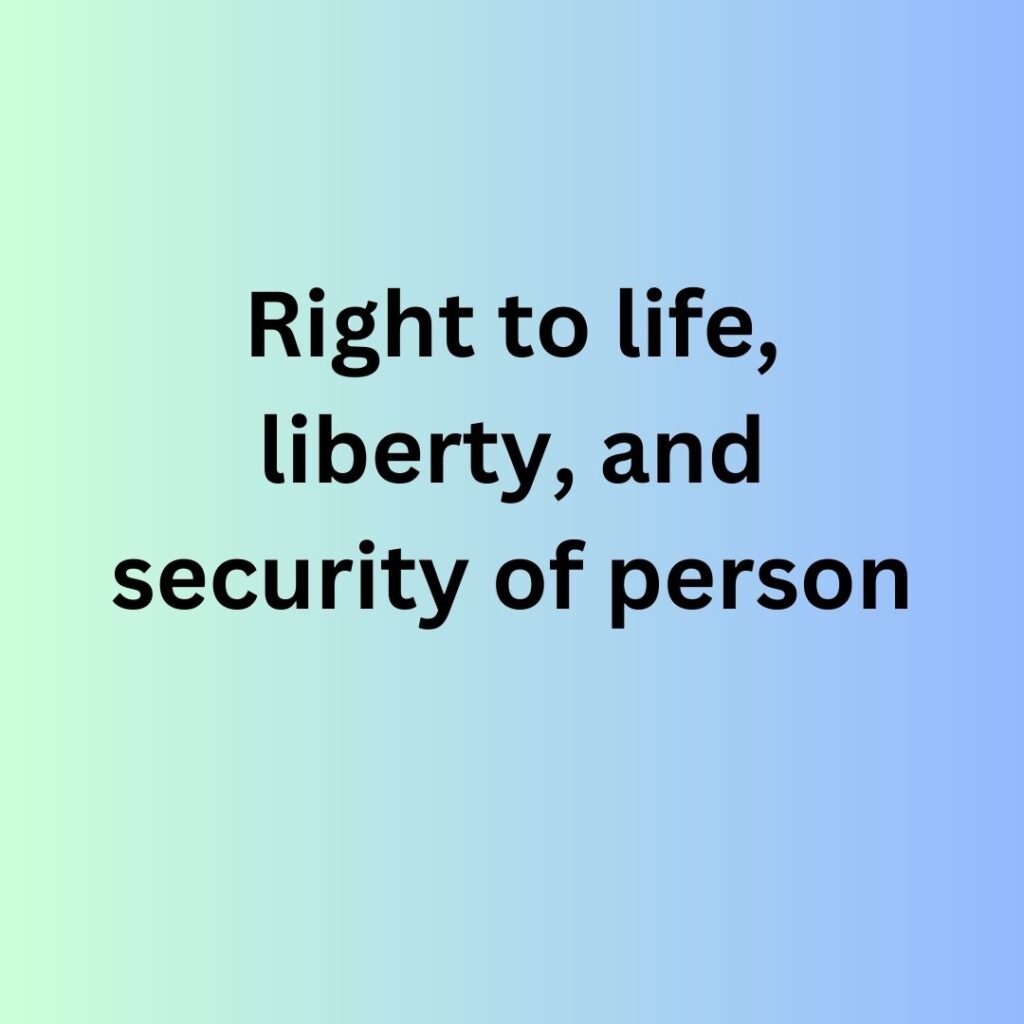
The right to life, liberty, and security of person is a fundamental human right that is recognized and protected by law. It is often considered to be one of the most basic and essential human rights, and is enshrined in various international human rights treaties, as well as in the constitutions of many countries.
जीवन, स्वतंत्रता और व्यक्ति की सुरक्षा का अधिकार एक मौलिक मानव अधिकार है जिसे कानून द्वारा मान्यता प्राप्त और संरक्षित किया जाता है। इसे अक्सर सबसे बुनियादी और आवश्यक मानव अधिकारों में से एक माना जाता है, और यह विभिन्न अंतरराष्ट्रीय मानवाधिकार संधियों के साथ-साथ कई देशों के संविधानों में भी निहित है।
The right to life means that every person has the right to live, and that no one should be arbitrarily deprived of their life. This right is often associated with the abolition of the death penalty, as well as with efforts to reduce violence and promote peace.
जीवन के अधिकार का अर्थ है कि प्रत्येक व्यक्ति को जीने का अधिकार है और किसी को भी मनमाने ढंग से अपने जीवन से वंचित नहीं किया जाना चाहिए। यह अधिकार अक्सर मृत्युदंड के उन्मूलन के साथ-साथ हिंसा को कम करने और शांति को बढ़ावा देने के प्रयासों से जुड़ा होता है।

The right to liberty means that every person has the right to be free, and that no one should be subjected to arbitrary arrest or detention. This right is closely linked to the concept of due process of law, which ensures that people are not detained without a fair trial or legal justification.
स्वतंत्रता के अधिकार का अर्थ है कि प्रत्येक व्यक्ति को स्वतंत्र होने का अधिकार है, और किसी को भी मनमाने ढंग से गिरफ्तार या हिरासत में नहीं लिया जाना चाहिए। यह अधिकार कानून की उचित प्रक्रिया की अवधारणा से निकटता से जुड़ा हुआ है, जो यह सुनिश्चित करता है कि निष्पक्ष परीक्षण या कानूनी औचित्य के बिना लोगों को हिरासत में नहीं लिया जाए।
The right to security of person means that every person has the right to be free from physical harm, threats, and intimidation. This right is often associated with efforts to reduce crime, violence, and other forms of harm to individuals and communities.
व्यक्ति की सुरक्षा के अधिकार का अर्थ है कि प्रत्येक व्यक्ति को शारीरिक नुकसान, धमकी और डराने-धमकाने से मुक्त होने का अधिकार है। यह अधिकार अक्सर अपराध, हिंसा और व्यक्तियों और समुदायों को नुकसान के अन्य रूपों को कम करने के प्रयासों से जुड़ा होता है।
Taken together, these three rights represent some of the most fundamental and important human rights, and are critical for ensuring that all individuals are able to live with dignity, freedom, and security.
एक साथ लिया गया, ये तीन अधिकार कुछ सबसे मौलिक और महत्वपूर्ण मानव अधिकारों का प्रतिनिधित्व करते हैं, और यह सुनिश्चित करने के लिए महत्वपूर्ण हैं कि सभी व्यक्ति सम्मान, स्वतंत्रता और सुरक्षा के साथ जीने में सक्षम हैं।
Right to freedom of thought, conscience, and religion
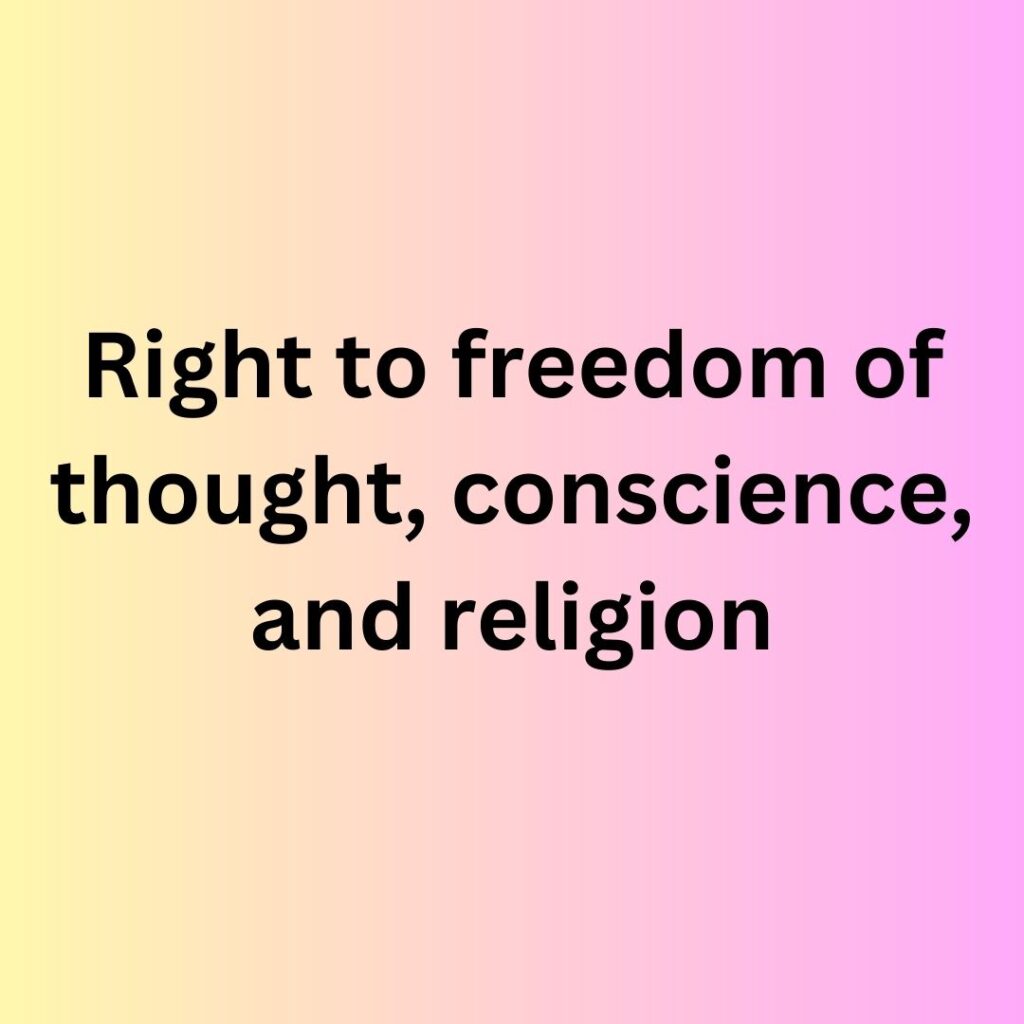
The right to freedom of thought, conscience, and religion is a fundamental human right that is recognized and protected by law. This right is enshrined in various international human rights treaties, as well as in the constitutions of many countries.
विचार, विवेक और धर्म की स्वतंत्रता का अधिकार एक मौलिक मानव अधिकार है जिसे कानून द्वारा मान्यता प्राप्त और संरक्षित किया जाता है। यह अधिकार विभिन्न अंतरराष्ट्रीय मानवाधिकार संधियों के साथ-साथ कई देशों के संविधानों में निहित है।
The right to freedom of thought means that every person has the right to hold any belief, opinion, or viewpoint they choose, without fear of persecution or coercion. This includes the right to change one’s beliefs or to hold no beliefs at all.
विचार की स्वतंत्रता के अधिकार का अर्थ है कि प्रत्येक व्यक्ति को उत्पीड़न या जबरदस्ती के डर के बिना किसी भी विश्वास, राय या दृष्टिकोण को चुनने का अधिकार है। इसमें किसी के विश्वास को बदलने या कोई विश्वास न रखने का अधिकार शामिल है।
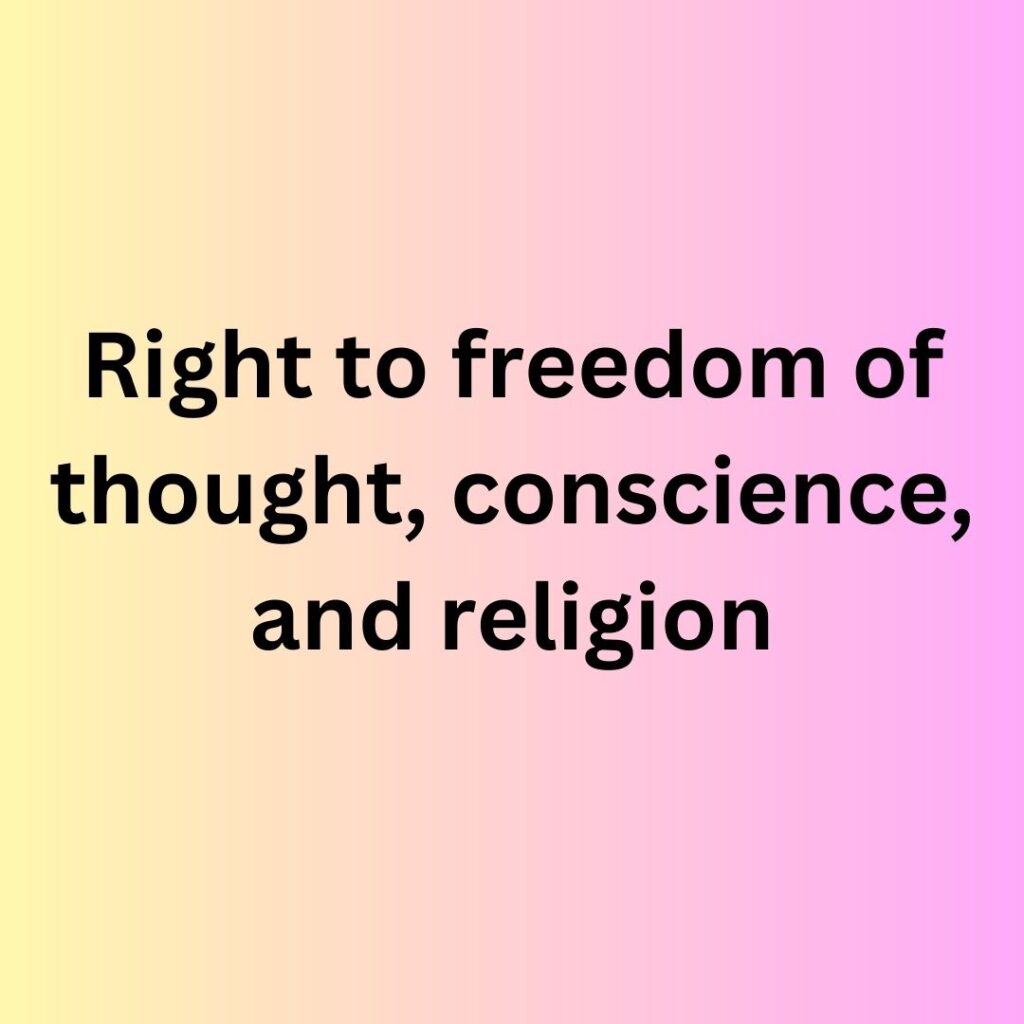
The right to freedom of conscience means that every person has the right to act according to their conscience, without fear of persecution or coercion. This includes the right to refuse to perform actions that go against one’s beliefs or values.
अंतरात्मा की स्वतंत्रता के अधिकार का अर्थ है कि प्रत्येक व्यक्ति को उत्पीड़न या जबरदस्ती के डर के बिना अपने विवेक के अनुसार कार्य करने का अधिकार है। इसमें किसी के विश्वास या मूल्यों के खिलाफ जाने वाले कार्यों को करने से इंकार करने का अधिकार शामिल है।
The right to freedom of religion means that every person has the right to practice their religion or belief system, individually or in community with others, without fear of persecution or coercion. This includes the right to manifest one’s religion or belief through worship, observance, and practice, as well as the right to change or renounce one’s religion or belief system.
धर्म की स्वतंत्रता के अधिकार का अर्थ है कि प्रत्येक व्यक्ति को उत्पीड़न या जबरदस्ती के डर के बिना, व्यक्तिगत रूप से या दूसरों के साथ समुदाय में अपने धर्म या विश्वास प्रणाली का अभ्यास करने का अधिकार है। इसमें पूजा, पालन और अभ्यास के माध्यम से किसी के धर्म या विश्वास को प्रकट करने का अधिकार, साथ ही किसी के धर्म या विश्वास प्रणाली को बदलने या त्यागने का अधिकार शामिल है।
Taken together, these three rights represent an important aspect of individual freedom and autonomy, and are essential for promoting respect for diversity and tolerance in society. They also serve to protect individuals from discrimination, persecution, or other forms of harm based on their beliefs or lack of beliefs.
एक साथ लिया गया, ये तीन अधिकार व्यक्तिगत स्वतंत्रता और स्वायत्तता के एक महत्वपूर्ण पहलू का प्रतिनिधित्व करते हैं, और समाज में विविधता और सहिष्णुता के लिए सम्मान को बढ़ावा देने के लिए आवश्यक हैं। वे व्यक्तियों को उनके विश्वासों या विश्वासों की कमी के आधार पर भेदभाव, उत्पीड़न, या अन्य प्रकार के नुकसान से बचाने के लिए भी काम करते हैं।
Right to freedom of expression and speech
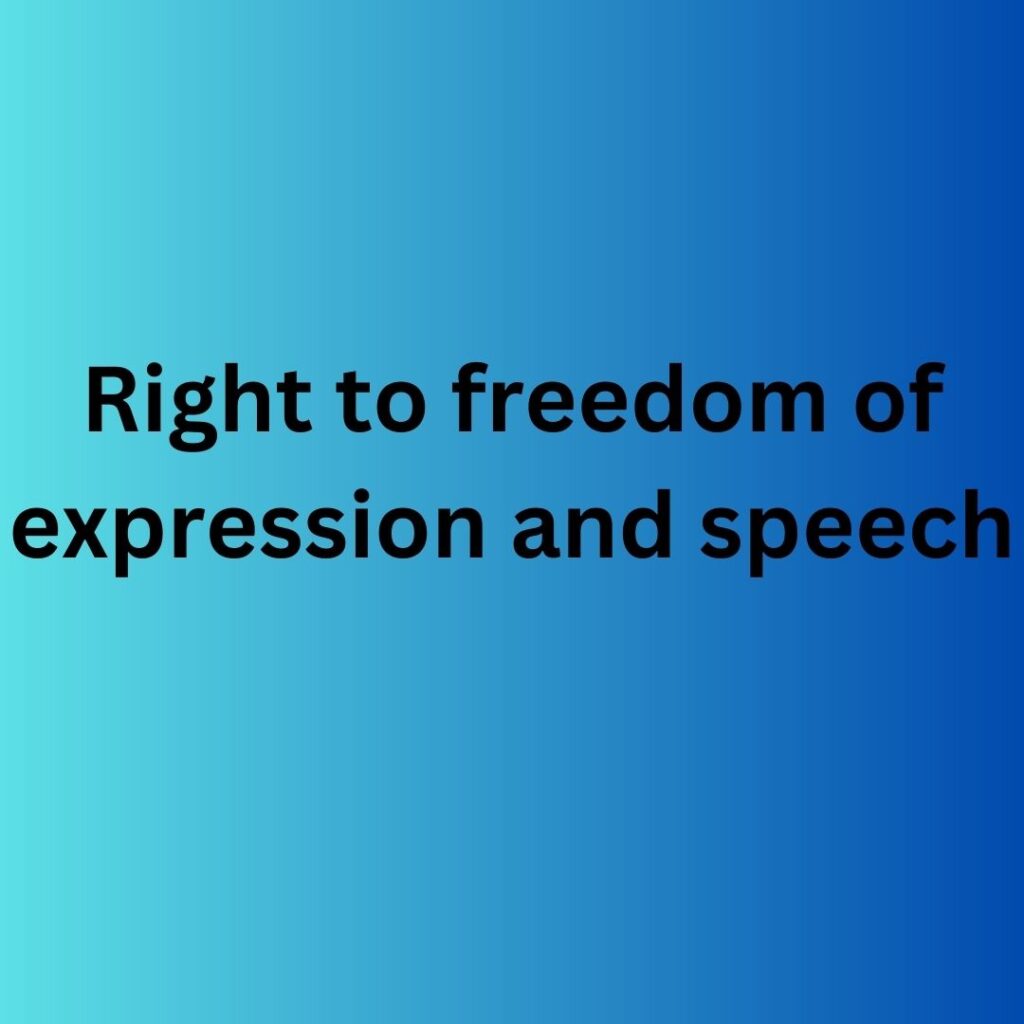
The right to freedom of expression and speech is a fundamental human right that is recognized and protected by law. This right is enshrined in various international human rights treaties, as well as in the constitutions of many countries.
अभिव्यक्ति और भाषण की स्वतंत्रता का अधिकार एक मौलिक मानव अधिकार है जिसे कानून द्वारा मान्यता प्राप्त और संरक्षित किया जाता है। यह अधिकार विभिन्न अंतरराष्ट्रीय मानवाधिकार संधियों के साथ-साथ कई देशों के संविधानों में निहित है।
The right to freedom of expression means that every person has the right to express themselves in any way they choose, without fear of persecution or censorship. This includes the right to seek, receive, and impart information and ideas through any media or platform, such as speech, writing, art, or the internet.
अभिव्यक्ति की स्वतंत्रता के अधिकार का अर्थ है कि प्रत्येक व्यक्ति को उत्पीड़न या सेंसरशिप के डर के बिना किसी भी तरह से खुद को अभिव्यक्त करने का अधिकार है। इसमें भाषण, लेखन, कला या इंटरनेट जैसे किसी भी मीडिया या मंच के माध्यम से सूचना और विचार प्राप्त करने, प्राप्त करने और प्रदान करने का अधिकार शामिल है।
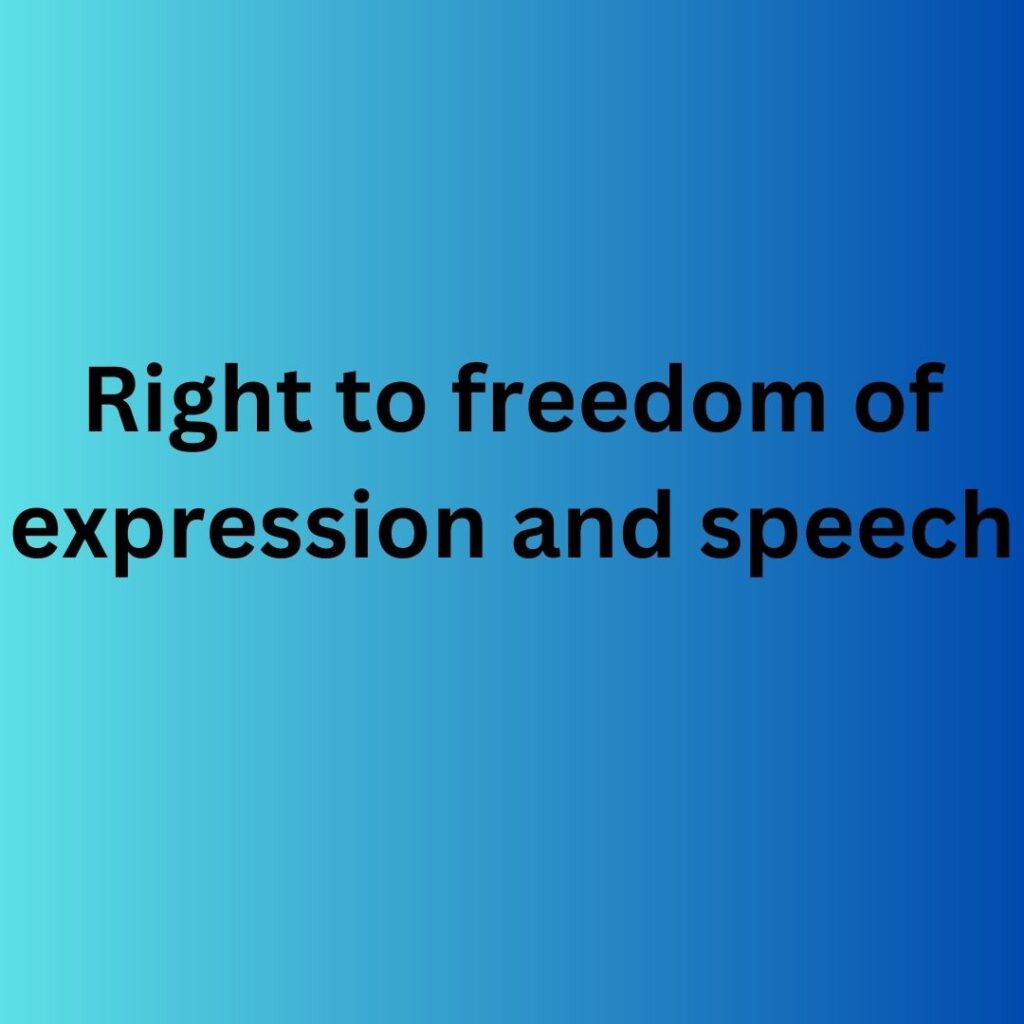
The right to freedom of speech means that every person has the right to express their opinions and ideas, even if they are controversial or unpopular. This includes the right to criticize the government, public officials, or other individuals or groups, without fear of persecution or retaliation.
अभिव्यक्ति की स्वतंत्रता के अधिकार का अर्थ है कि प्रत्येक व्यक्ति को अपनी राय और विचार व्यक्त करने का अधिकार है, भले ही वे विवादास्पद या अलोकप्रिय हों। इसमें उत्पीड़न या प्रतिशोध के डर के बिना सरकार, सार्वजनिक अधिकारियों, या अन्य व्यक्तियों या समूहों की आलोचना करने का अधिकार शामिल है।
The right to freedom of expression and speech is considered essential for promoting open debate, democratic participation, and the free flow of information and ideas. It is also closely linked to other human rights, such as the right to freedom of thought, conscience, and religion, and the right to privacy.
खुली बहस, लोकतांत्रिक भागीदारी और सूचना और विचारों के मुक्त प्रवाह को बढ़ावा देने के लिए अभिव्यक्ति और भाषण की स्वतंत्रता का अधिकार आवश्यक माना जाता है। यह अन्य मानवाधिकारों से भी निकटता से जुड़ा हुआ है, जैसे कि विचार, विवेक और धर्म की स्वतंत्रता का अधिकार और निजता का अधिकार।
However, the right to freedom of expression and speech is not absolute, and may be subject to certain restrictions in order to protect the rights of others or to maintain public order and safety. For example, hate speech, incitement to violence, and speech that promotes terrorism or undermines national security may be restricted in certain circumstances.
हालाँकि, अभिव्यक्ति और भाषण की स्वतंत्रता का अधिकार पूर्ण नहीं है, और दूसरों के अधिकारों की रक्षा करने या सार्वजनिक व्यवस्था और सुरक्षा बनाए रखने के लिए कुछ प्रतिबंधों के अधीन हो सकता है। उदाहरण के लिए, अभद्र भाषा, हिंसा के लिए उकसाना, और आतंकवाद को बढ़ावा देने वाले या राष्ट्रीय सुरक्षा को कमजोर करने वाले भाषण को कुछ परिस्थितियों में प्रतिबंधित किया जा सकता है।
Right to peaceful assembly and association
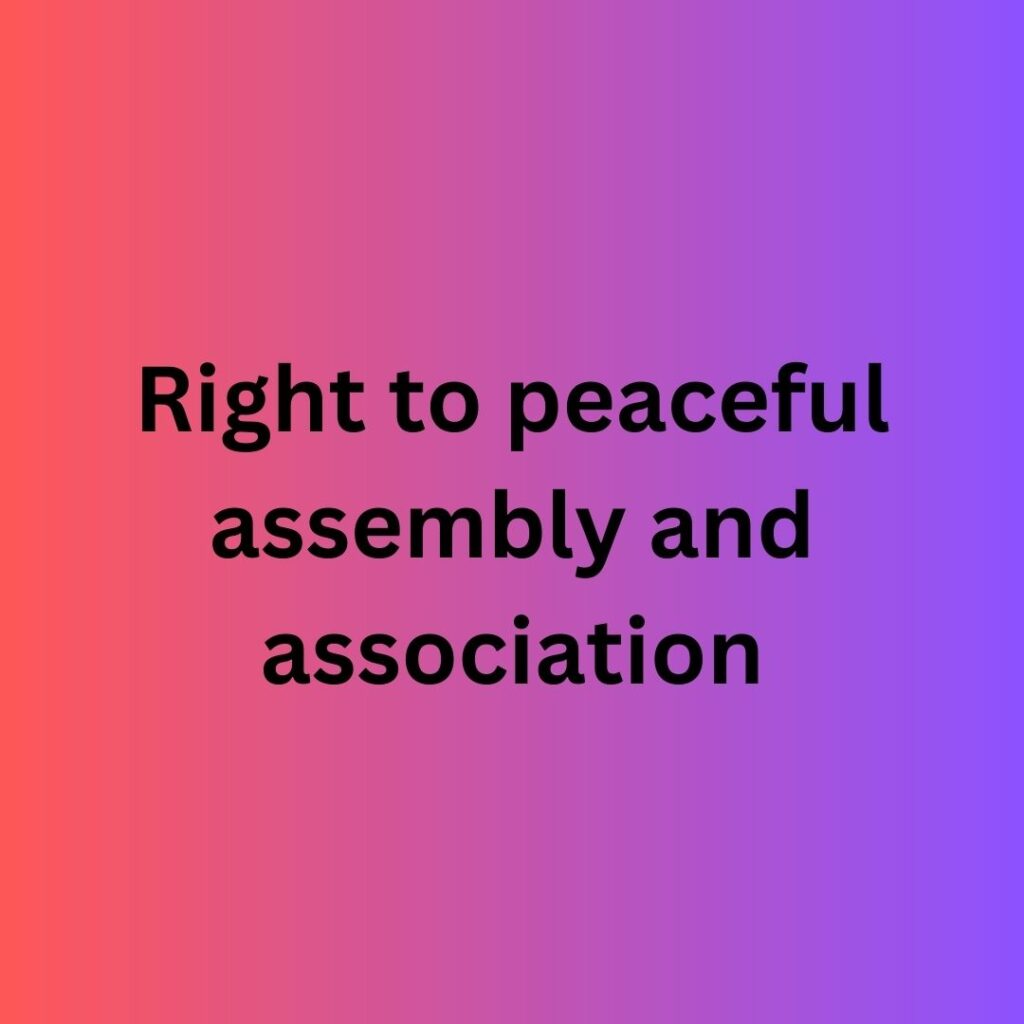
The right to peaceful assembly and association is a fundamental human right that is recognized and protected by law. This right is enshrined in various international human rights treaties, as well as in the constitutions of many countries.
शांतिपूर्ण सभा और संघ का अधिकार एक मौलिक मानव अधिकार है जिसे कानून द्वारा मान्यता प्राप्त और संरक्षित किया जाता है। यह अधिकार विभिन्न अंतरराष्ट्रीय मानवाधिकार संधियों के साथ-साथ कई देशों के संविधानों में निहित है।
The right to peaceful assembly means that every person has the right to gather with others in a peaceful and nonviolent manner, for the purpose of expressing their views, opinions, or concerns. This includes the right to hold peaceful protests, marches, and demonstrations, as well as the right to gather for social or cultural activities.
शांतिपूर्ण सभा के अधिकार का अर्थ है कि प्रत्येक व्यक्ति को अपने विचारों, विचारों या चिंताओं को व्यक्त करने के उद्देश्य से शांतिपूर्ण और अहिंसक तरीके से दूसरों के साथ इकट्ठा होने का अधिकार है। इसमें शांतिपूर्ण विरोध, मार्च और प्रदर्शन आयोजित करने का अधिकार, साथ ही सामाजिक या सांस्कृतिक गतिविधियों के लिए इकट्ठा होने का अधिकार शामिल है।

The right to association means that every person has the right to form and join groups or organizations, for any lawful purpose, without fear of persecution or discrimination. This includes the right to form political parties, trade unions, and other civil society groups, as well as the right to participate in the activities of existing groups or organizations.
एसोसिएशन के अधिकार का अर्थ है कि प्रत्येक व्यक्ति को उत्पीड़न या भेदभाव के डर के बिना, किसी भी वैध उद्देश्य के लिए समूहों या संगठनों को बनाने और शामिल होने का अधिकार है। इसमें राजनीतिक दलों, ट्रेड यूनियनों और अन्य नागरिक समाज समूहों के गठन के अधिकार के साथ-साथ मौजूदा समूहों या संगठनों की गतिविधियों में भाग लेने का अधिकार शामिल है।
The right to peaceful assembly and association is considered essential for promoting democratic participation, social cohesion, and the protection of human rights. It allows individuals to come together to express their views and to take collective action on issues that are important to them. It also allows individuals to form and join groups or organizations that can advocate for their interests and hold governments and other powerful actors accountable.

लोकतांत्रिक भागीदारी, सामाजिक एकता और मानवाधिकारों की सुरक्षा को बढ़ावा देने के लिए शांतिपूर्ण सभा और संघ का अधिकार आवश्यक माना जाता है। यह व्यक्तियों को अपने विचार व्यक्त करने और उनके लिए महत्वपूर्ण मुद्दों पर सामूहिक कार्रवाई करने के लिए एक साथ आने की अनुमति देता है। यह व्यक्तियों को समूहों या संगठनों को बनाने और उनमें शामिल होने की भी अनुमति देता है जो उनके हितों की वकालत कर सकते हैं और सरकारों और अन्य शक्तिशाली अभिनेताओं को जवाबदेह ठहरा सकते हैं।
However, the right to peaceful assembly and association may be subject to certain restrictions in order to protect public safety, national security, or the rights and freedoms of others. Any restrictions on these rights must be necessary, proportionate, and in accordance with the law.
हालाँकि, सार्वजनिक सुरक्षा, राष्ट्रीय सुरक्षा, या दूसरों के अधिकारों और स्वतंत्रता की रक्षा के लिए शांतिपूर्ण सभा और संघ का अधिकार कुछ प्रतिबंधों के अधीन हो सकता है। इन अधिकारों पर कोई भी प्रतिबंध आवश्यक, आनुपातिक और कानून के अनुसार होना चाहिए।
Right to equality before the law and equal protection of the law
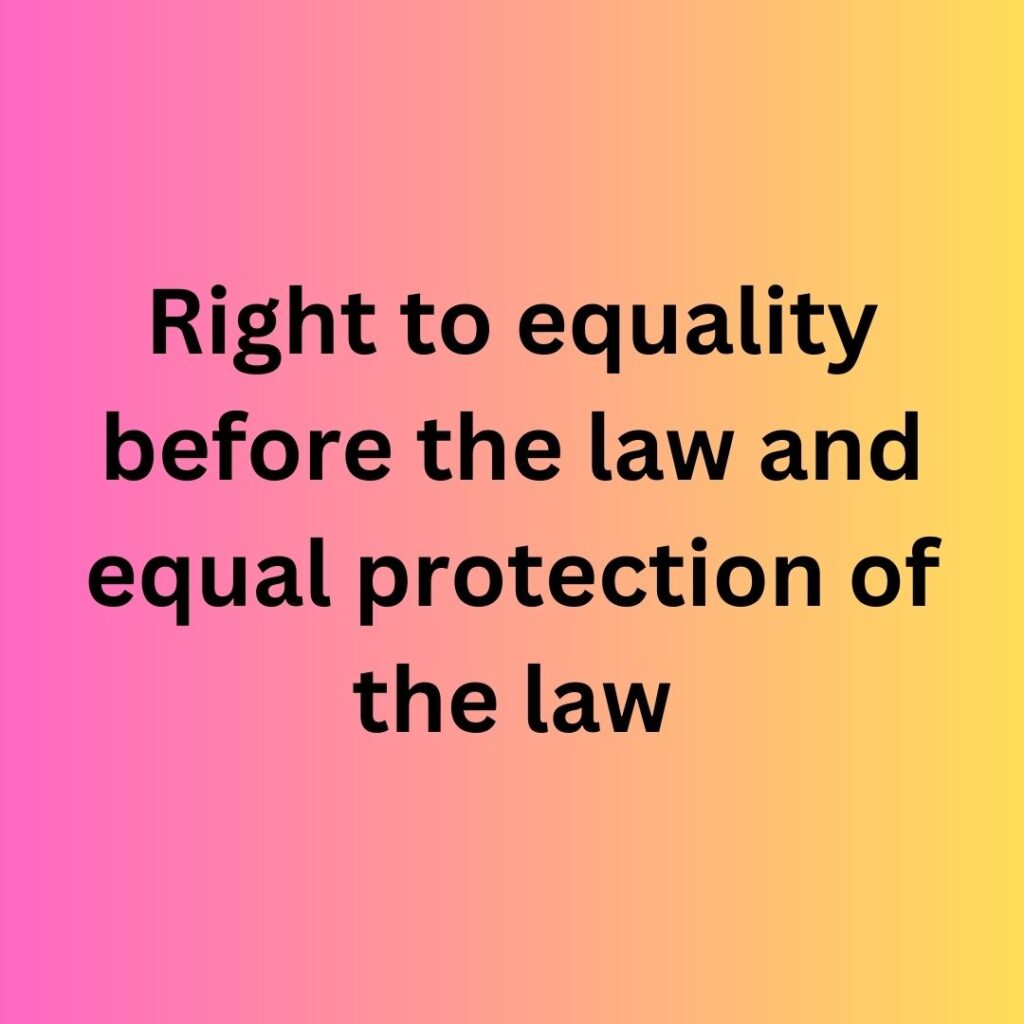
The right to equality before the law and equal protection of the law is a fundamental human right that is recognized and protected by law. This right is enshrined in various international human rights treaties, as well as in the constitutions of many countries.
कानून के समक्ष समानता का अधिकार और कानून की समान सुरक्षा एक मौलिक मानव अधिकार है जिसे कानून द्वारा मान्यता प्राप्त और संरक्षित किया जाता है। यह अधिकार विभिन्न अंतरराष्ट्रीय मानवाधिकार संधियों के साथ-साथ कई देशों के संविधानों में निहित है। The right to equality before the law means that every person is entitled to equal treatment under the law, without discrimination or favoritism. This means that all individuals are entitled to the same legal rights and protections, regardless of their race, gender, religion, or other personal characteristics. कानून के समक्ष समानता के अधिकार का अर्थ है कि प्रत्येक व्यक्ति बिना किसी भेदभाव या पक्षपात के कानून के तहत समान व्यवहार का हकदार है। इसका अर्थ है कि सभी व्यक्ति समान कानूनी अधिकारों और सुरक्षा के हकदार हैं, उनकी जाति, लिंग, धर्म या अन्य व्यक्तिगत विशेषताओं की परवाह किए बिना। The right to equal protection of the law means that every person is entitled to the same legal remedies and protections, and that no one should be subjected to arbitrary or unfair treatment by the legal system. This means that all individuals are entitled to due process of law, including the right to a fair trial, the presumption of innocence, and the right to legal representation. कानून के समान संरक्षण के अधिकार का अर्थ है कि प्रत्येक व्यक्ति समान कानूनी उपायों और सुरक्षा का हकदार है, और यह कि कानूनी प्रणाली द्वारा किसी के साथ मनमाना या अनुचित व्यवहार नहीं किया जाना चाहिए। इसका मतलब यह है कि सभी व्यक्ति कानून की उचित प्रक्रिया के हकदार हैं, जिसमें निष्पक्ष सुनवाई का अधिकार, निर्दोषता का अनुमान और कानूनी प्रतिनिधित्व का अधिकार शामिल है। The right to equality before the law and equal protection of the law is considered essential for promoting justice and fairness in society. It helps to ensure that all individuals are treated with dignity and respect, and that they have access to the legal remedies and protections they need to protect their rights and interests.
कानून के समक्ष समानता का अधिकार और कानून का समान संरक्षण समाज में न्याय और निष्पक्षता को बढ़ावा देने के लिए आवश्यक माना जाता है। यह सुनिश्चित करने में मदद करता है कि सभी व्यक्तियों के साथ गरिमा और सम्मान के साथ व्यवहार किया जाता है, और उनके पास अपने अधिकारों और हितों की रक्षा के लिए आवश्यक कानूनी उपायों और सुरक्षा तक पहुंच है।
However, despite the legal protections that exist, discrimination and bias can still occur within the legal system. To address this, it is important for legal systems to be vigilant in ensuring that all individuals are treated equally and fairly, and for individuals to be aware of their legal rights and protections.
हालांकि, मौजूद कानूनी सुरक्षा के बावजूद, कानूनी प्रणाली के भीतर भेदभाव और पक्षपात अभी भी हो सकता है। इसे संबोधित करने के लिए, कानूनी प्रणालियों के लिए यह सुनिश्चित करने के लिए सतर्क रहना महत्वपूर्ण है कि सभी व्यक्तियों के साथ समान और निष्पक्ष व्यवहार किया जाए, और व्यक्तियों को उनके कानूनी अधिकारों और सुरक्षा के बारे में पता होना चाहिए।
Right to a fair trial and due process of law
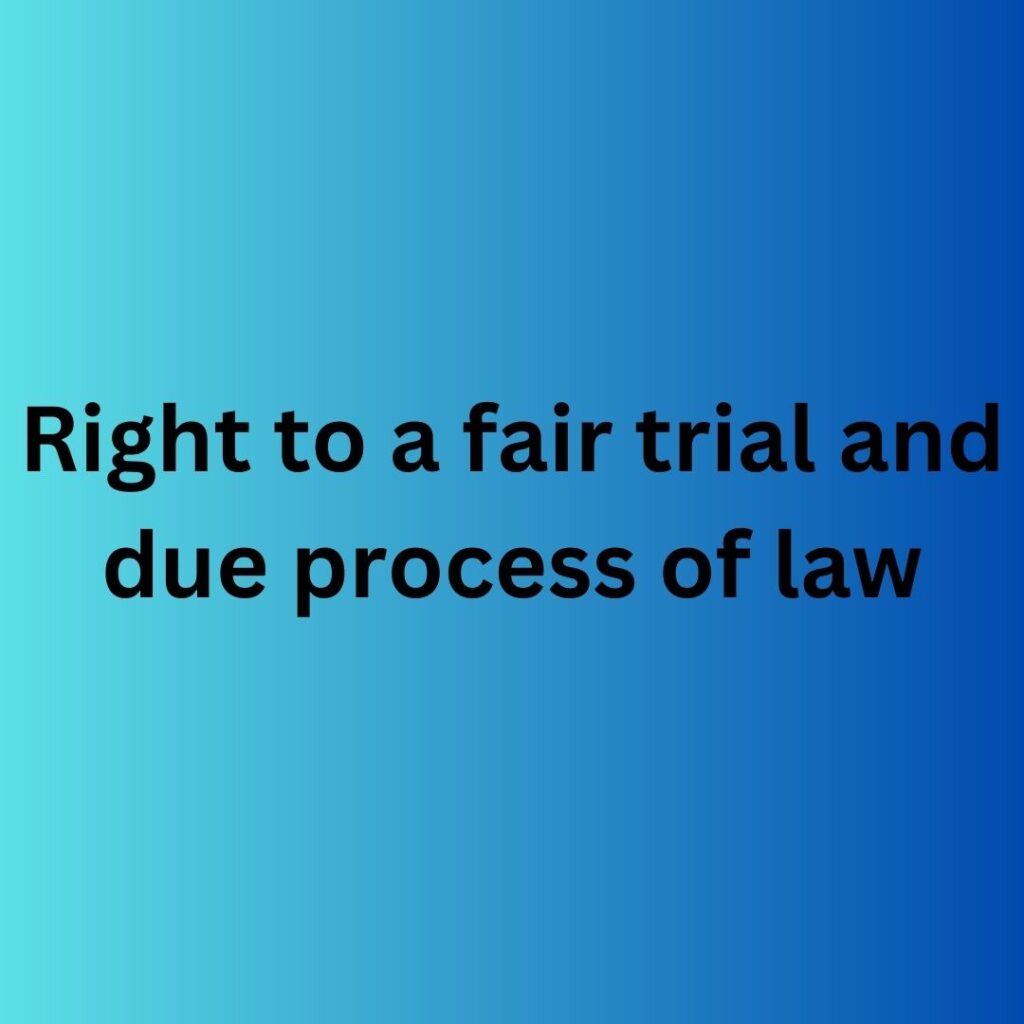
The right to a fair trial and due process of law is a fundamental human right that is recognized and protected by law. This right is enshrined in various international human rights treaties, as well as in the constitutions of many countries.
निष्पक्ष सुनवाई का अधिकार और कानून की उचित प्रक्रिया एक मौलिक मानव अधिकार है जिसे कानून द्वारा मान्यता प्राप्त और संरक्षित किया जाता है। यह अधिकार विभिन्न अंतरराष्ट्रीय मानवाधिकार संधियों के साथ-साथ कई देशों के संविधानों में निहित है।
The right to a fair trial means that every person has the right to a fair and impartial hearing before a competent and independent tribunal, and to be treated with dignity and respect throughout the legal process. This includes the right to be informed of the charges against them, the right to legal representation, the right to present evidence, and the right to a reasoned judgment.
निष्पक्ष सुनवाई के अधिकार का अर्थ है कि प्रत्येक व्यक्ति को एक सक्षम और स्वतंत्र न्यायाधिकरण के समक्ष निष्पक्ष और निष्पक्ष सुनवाई का अधिकार है, और पूरी कानूनी प्रक्रिया के दौरान गरिमा और सम्मान के साथ व्यवहार किया जाना है। इसमें उनके खिलाफ आरोपों के बारे में सूचित करने का अधिकार, कानूनी प्रतिनिधित्व का अधिकार, सबूत पेश करने का अधिकार और तर्कपूर्ण निर्णय का अधिकार शामिल है।
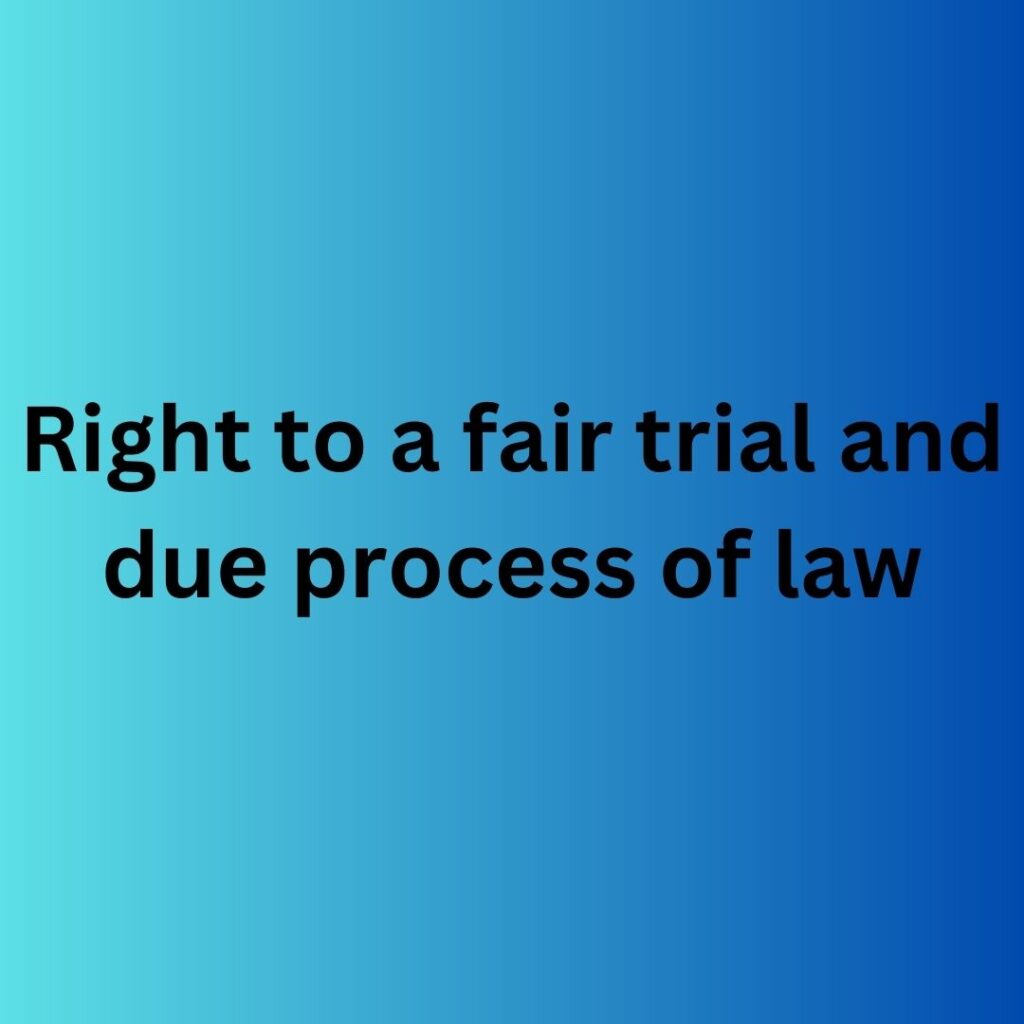
The right to due process of law means that every person is entitled to legal protections and procedures that ensure that their rights are respected and upheld. This includes the right to be informed of the reasons for any arrest or detention, the right to a fair and prompt trial, and the right to challenge any violations of their legal rights.
कानून की नियत प्रक्रिया के अधिकार का अर्थ है कि प्रत्येक व्यक्ति कानूनी सुरक्षा और प्रक्रियाओं का हकदार है जो यह सुनिश्चित करता है कि उनके अधिकारों का सम्मान और समर्थन किया जाता है। इसमें किसी भी गिरफ्तारी या हिरासत के कारणों के बारे में सूचित किए जाने का अधिकार, निष्पक्ष और त्वरित सुनवाई का अधिकार, और उनके कानूनी अधिकारों के किसी भी उल्लंघन को चुनौती देने का अधिकार शामिल है।
The right to a fair trial and due process of law is considered essential for promoting justice and protecting individuals from arbitrary or abusive treatment by the legal system. It helps to ensure that all individuals are treated equally and fairly under the law, and that their legal rights and protections are respected and upheld.
न्याय को बढ़ावा देने और कानूनी प्रणाली द्वारा मनमाने या अपमानजनक व्यवहार से व्यक्तियों की रक्षा के लिए एक निष्पक्ष परीक्षण और कानून की उचित प्रक्रिया का अधिकार आवश्यक माना जाता है। यह सुनिश्चित करने में मदद करता है कि कानून के तहत सभी व्यक्तियों के साथ समान और निष्पक्ष व्यवहार किया जाता है, और यह कि उनके कानूनी अधिकारों और सुरक्षा का सम्मान और समर्थन किया जाता है।
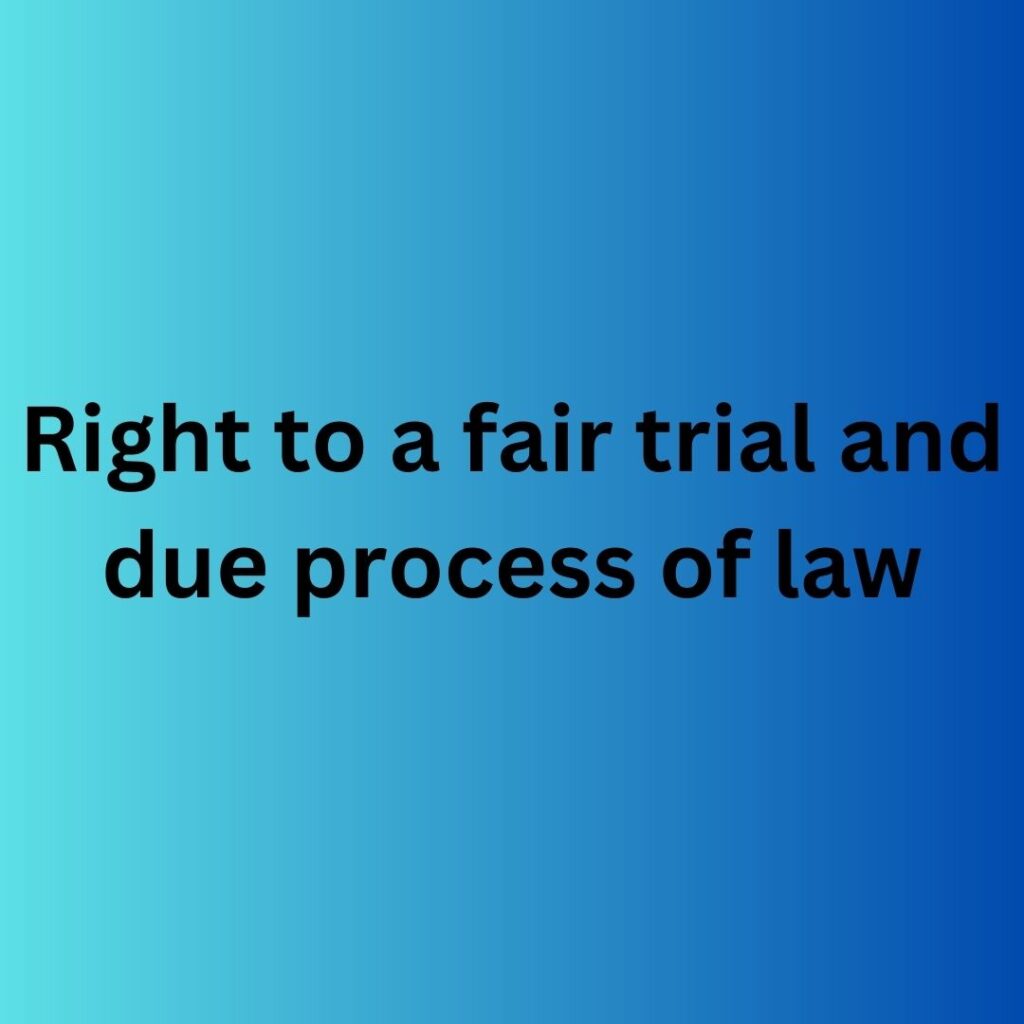
However, the right to a fair trial and due process of law is not always guaranteed, and can be subject to violations and abuse. This can occur in situations such as prolonged pretrial detention, lack of access to legal representation, and unfair or biased trials. To address these issues, it is important for legal systems to be vigilant in upholding the principles of fair trial and due process, and for individuals to be aware of their legal rights and protections.
हालांकि, एक निष्पक्ष परीक्षण और कानून की उचित प्रक्रिया के अधिकार की हमेशा गारंटी नहीं होती है, और यह उल्लंघन और दुरुपयोग के अधीन हो सकता है। यह लंबे समय तक पूर्व-परीक्षण निरोध, कानूनी प्रतिनिधित्व तक पहुंच की कमी और अनुचित या पक्षपाती परीक्षणों जैसी स्थितियों में हो सकता है। इन मुद्दों को हल करने के लिए, कानूनी प्रणालियों के लिए यह महत्वपूर्ण है कि वे निष्पक्ष परीक्षण और उचित प्रक्रिया के सिद्धांतों को कायम रखने के लिए सतर्क रहें, और व्यक्तियों को अपने कानूनी अधिकारों और सुरक्षा के बारे में जागरूक होना चाहिए।
Right to privacy and protection of personal information
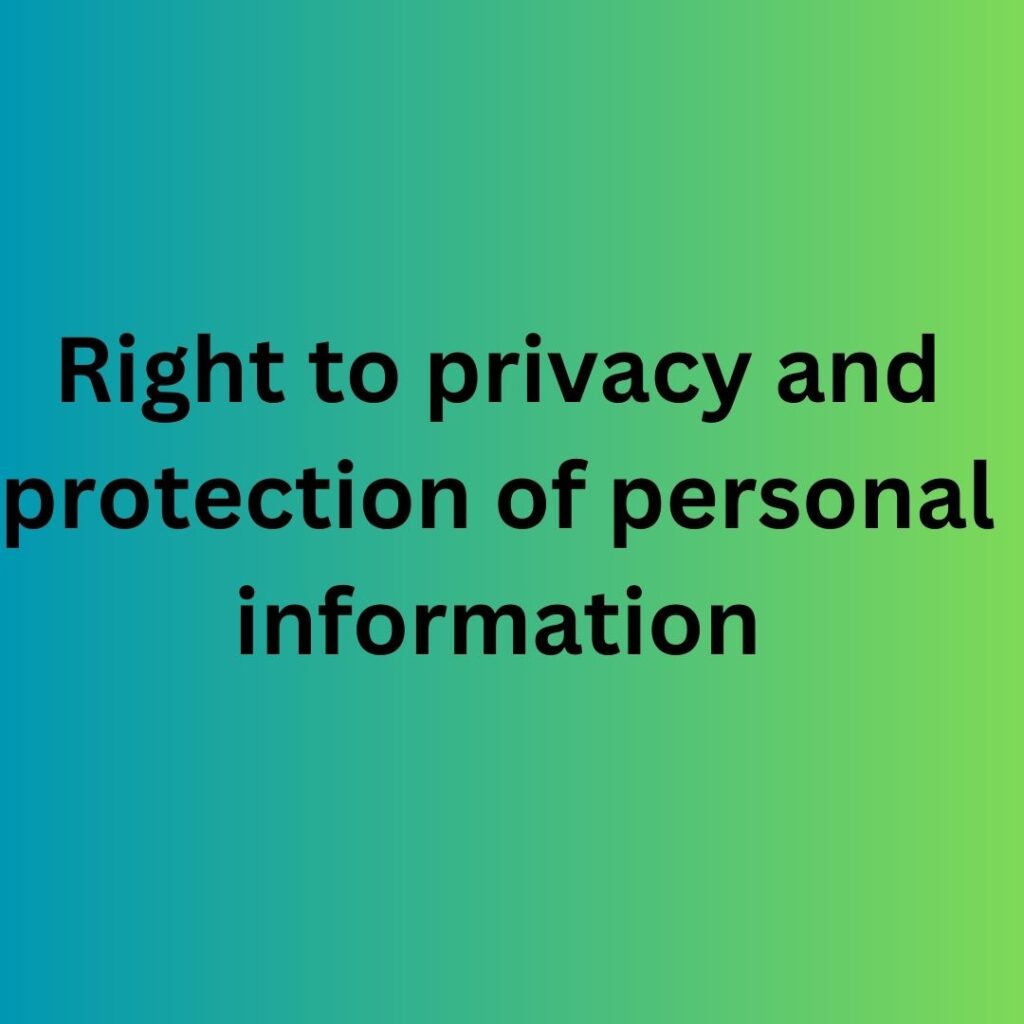
The right to privacy and protection of personal information is a fundamental human right that is recognized and protected by law. This right is enshrined in various international human rights treaties, as well as in the constitutions of many countries.
गोपनीयता का अधिकार और व्यक्तिगत जानकारी की सुरक्षा एक मौलिक मानव अधिकार है जिसे कानून द्वारा मान्यता प्राप्त और संरक्षित किया जाता है। यह अधिकार विभिन्न अंतरराष्ट्रीय मानवाधिकार संधियों के साथ-साथ कई देशों के संविधानों में निहित है।
The right to privacy means that every person has the right to be free from unwanted intrusion into their personal life and affairs, and to control how their personal information is collected, used, and shared. This includes the right to privacy in their home, their personal communications, and their personal activities.
निजता के अधिकार का अर्थ है कि प्रत्येक व्यक्ति को अपने व्यक्तिगत जीवन और मामलों में अवांछित घुसपैठ से मुक्त होने का अधिकार है और यह नियंत्रित करने का अधिकार है कि उनकी व्यक्तिगत जानकारी कैसे एकत्र, उपयोग और साझा की जाती है। इसमें उनके घर में निजता का अधिकार, उनके व्यक्तिगत संचार और उनकी व्यक्तिगत गतिविधियां शामिल हैं।
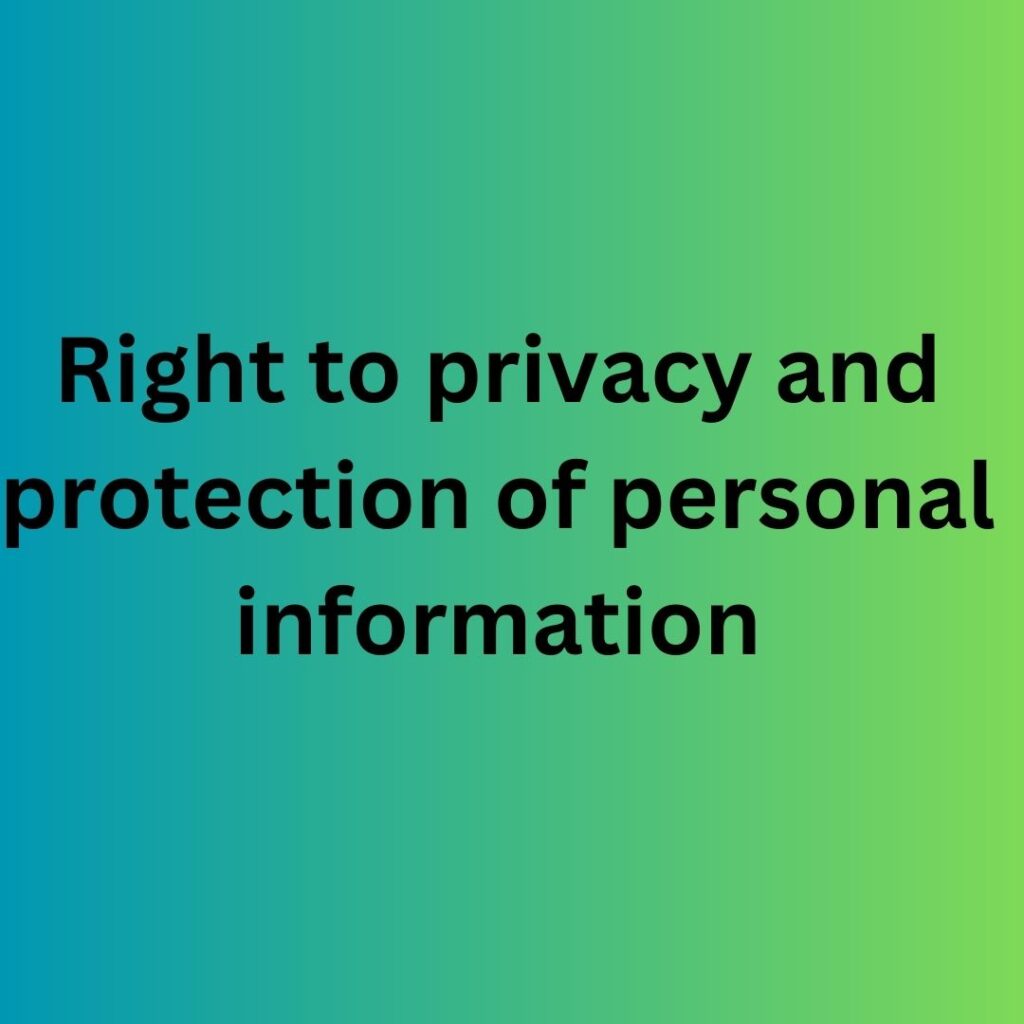
The right to protection of personal information means that every person has the right to have their personal data and information protected from unauthorized access, use, or disclosure. This includes the right to know what personal information is being collected about them, the right to access and correct their personal information, and the right to have their personal information deleted or destroyed when it is no longer needed.
व्यक्तिगत जानकारी की सुरक्षा के अधिकार का अर्थ है कि प्रत्येक व्यक्ति को अपने व्यक्तिगत डेटा और जानकारी को अनधिकृत पहुंच, उपयोग या प्रकटीकरण से सुरक्षित रखने का अधिकार है। इसमें यह जानने का अधिकार शामिल है कि उनके बारे में कौन सी व्यक्तिगत जानकारी एकत्र की जा रही है, उनकी व्यक्तिगत जानकारी तक पहुँचने और सही करने का अधिकार, और उनकी व्यक्तिगत जानकारी को हटाने या नष्ट करने का अधिकार जब इसकी आवश्यकता नहीं है।
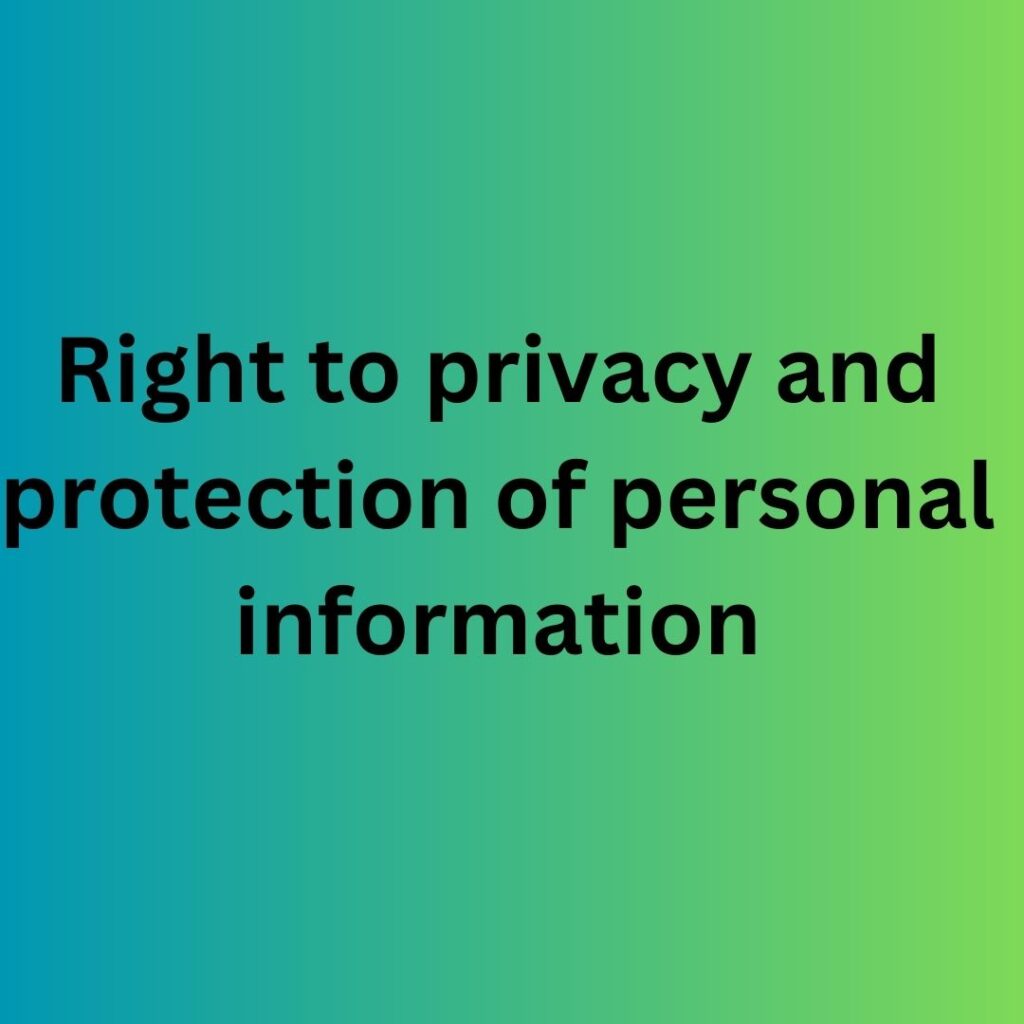
The right to privacy and protection of personal information is considered essential for promoting autonomy, dignity, and personal freedom. It helps to ensure that individuals have control over their personal information, and that their personal information is not used or abused by others without their consent.
स्वायत्तता, गरिमा और व्यक्तिगत स्वतंत्रता को बढ़ावा देने के लिए व्यक्तिगत जानकारी की निजता और सुरक्षा के अधिकार को आवश्यक माना जाता है। यह सुनिश्चित करने में मदद करता है कि व्यक्तियों का उनकी व्यक्तिगत जानकारी पर नियंत्रण है, और यह कि उनकी व्यक्तिगत जानकारी का दूसरों द्वारा उनकी सहमति के बिना उपयोग या दुरुपयोग नहीं किया जाता है।
However, the right to privacy and protection of personal information can be challenging to uphold in an era of widespread data collection and digital surveillance. To address these challenges, it is important for legal systems to develop strong data protection laws and regulations, and for individuals to be vigilant in protecting their personal information and privacy rights.
हालांकि, व्यापक डेटा संग्रह और डिजिटल निगरानी के युग में व्यक्तिगत जानकारी की निजता और सुरक्षा के अधिकार को बनाए रखना चुनौतीपूर्ण हो सकता है। इन चुनौतियों का समाधान करने के लिए, कानूनी प्रणालियों के लिए मजबूत डेटा सुरक्षा कानूनों और विनियमों को विकसित करना और व्यक्तियों के लिए अपनी व्यक्तिगत जानकारी और गोपनीयता अधिकारों की सुरक्षा में सतर्क रहना महत्वपूर्ण है।
Right to work, education, and healthcare
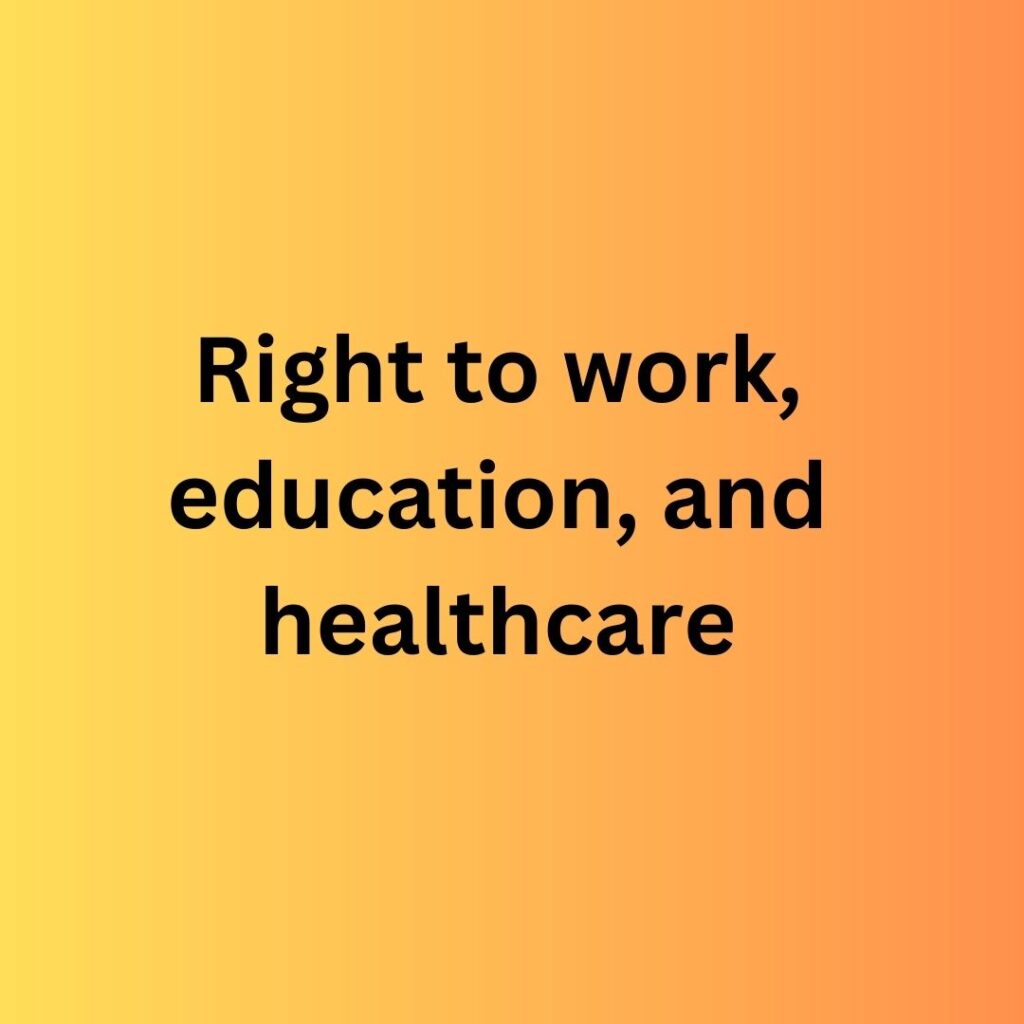
The right to work, education, and healthcare are fundamental human rights that are recognized and protected by law. These rights are enshrined in various international human rights treaties, as well as in the constitutions of many countries.
काम, शिक्षा और स्वास्थ्य सेवा का अधिकार मौलिक मानवाधिकार हैं जिन्हें कानून द्वारा मान्यता प्राप्त और संरक्षित किया जाता है। ये अधिकार विभिन्न अंतरराष्ट्रीय मानवाधिकार संधियों के साथ-साथ कई देशों के संविधानों में निहित हैं।
The right to work means that every person has the right to work and to earn a living, without discrimination or exploitation. This includes the right to fair wages, safe working conditions, and the right to form and join trade unions.
काम करने के अधिकार का अर्थ है कि प्रत्येक व्यक्ति को बिना किसी भेदभाव या शोषण के काम करने और जीविकोपार्जन का अधिकार है। इसमें उचित मजदूरी का अधिकार, काम करने की सुरक्षित स्थिति और ट्रेड यूनियन बनाने और उसमें शामिल होने का अधिकार शामिल है।
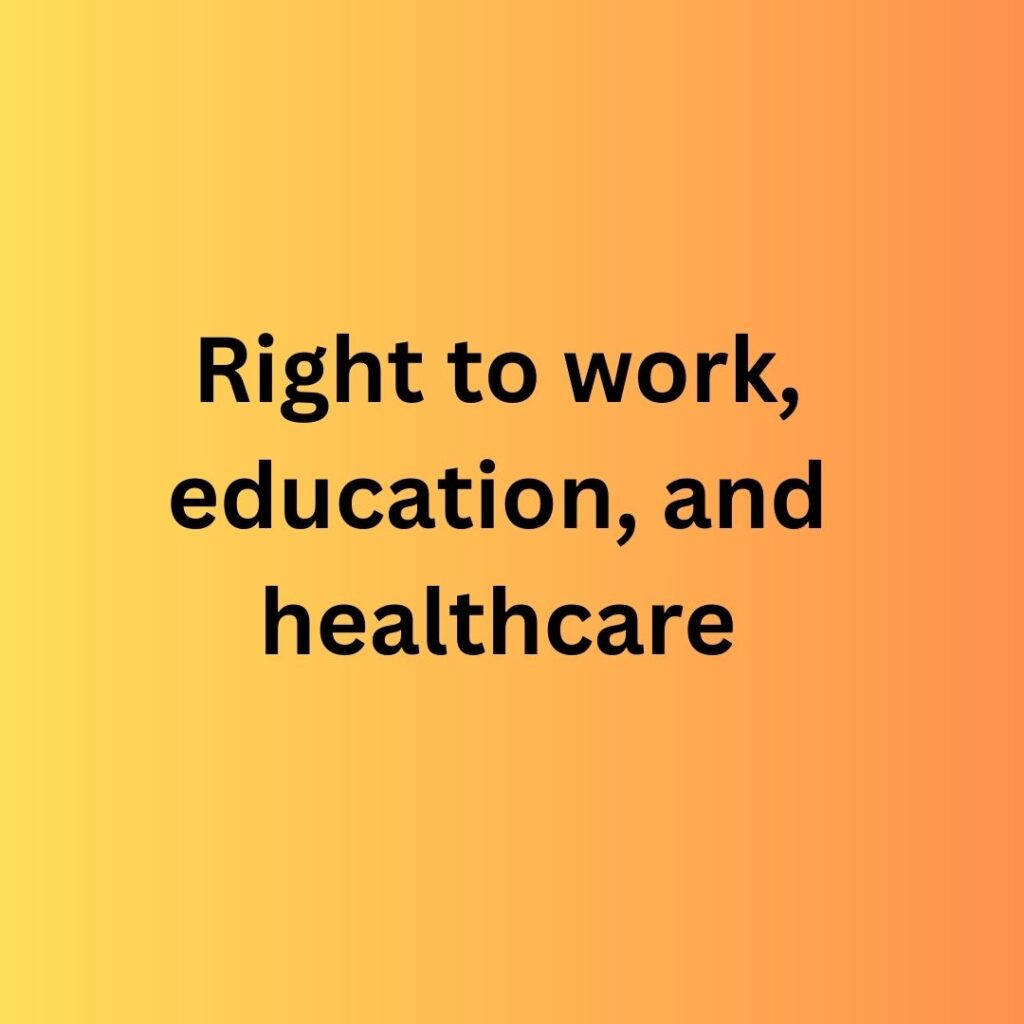
The right to education means that every person has the right to access quality education that is free, accessible, and compulsory at the primary level. This includes the right to access education without discrimination, the right to choose the type of education, and the right to receive education that is relevant and meets the needs of the individual.
शिक्षा के अधिकार का अर्थ है कि प्रत्येक व्यक्ति को प्राथमिक स्तर पर मुफ्त, सुलभ और अनिवार्य गुणवत्तापूर्ण शिक्षा प्राप्त करने का अधिकार है। इसमें बिना किसी भेदभाव के शिक्षा प्राप्त करने का अधिकार, शिक्षा के प्रकार को चुनने का अधिकार और प्रासंगिक और व्यक्ति की जरूरतों को पूरा करने वाली शिक्षा प्राप्त करने का अधिकार शामिल है।
The right to healthcare means that every person has the right to access affordable and quality healthcare, without discrimination or financial barriers. This includes the right to receive healthcare services that are available, accessible, and acceptable, and the right to access essential medicines.
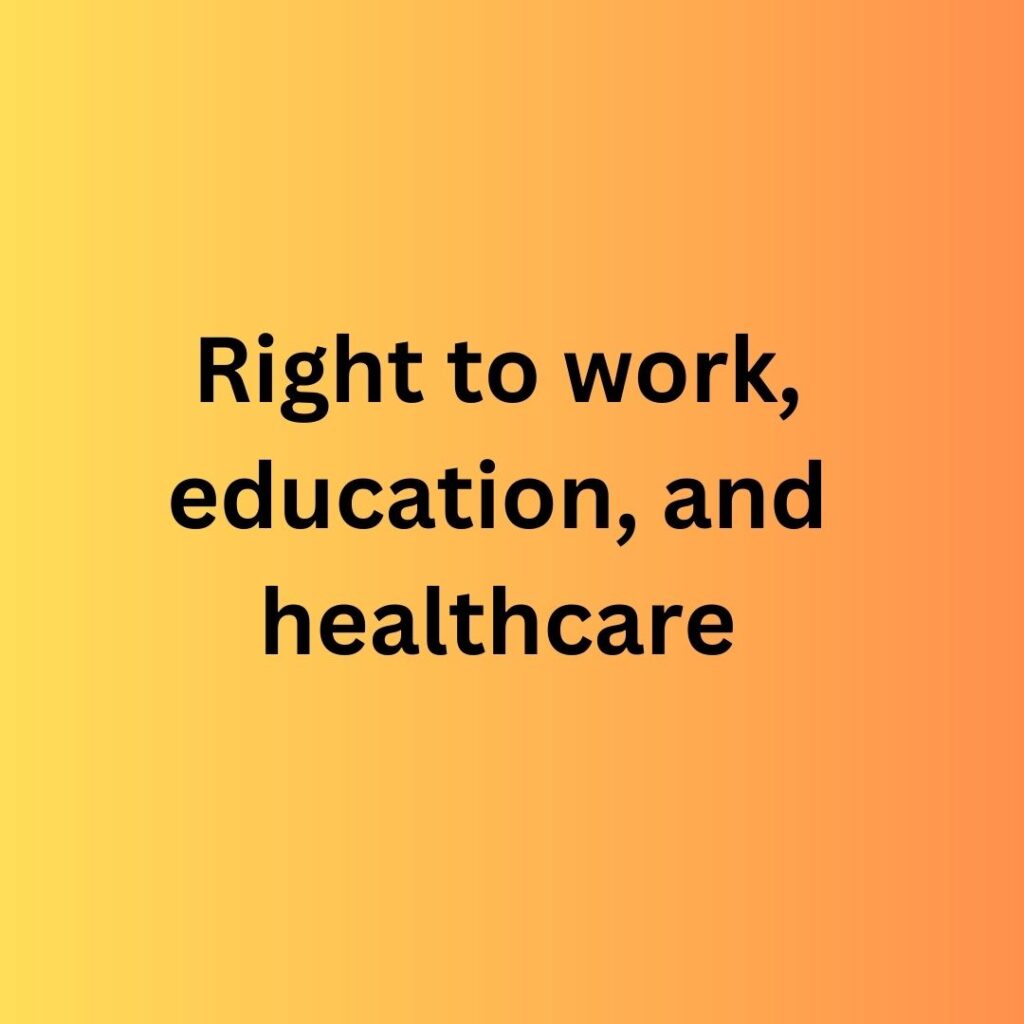
स्वास्थ्य सेवा के अधिकार का अर्थ है कि प्रत्येक व्यक्ति को बिना किसी भेदभाव या वित्तीय बाधाओं के सस्ती और गुणवत्तापूर्ण स्वास्थ्य सेवा प्राप्त करने का अधिकार है। इसमें उपलब्ध, सुलभ और स्वीकार्य स्वास्थ्य सेवाएं प्राप्त करने का अधिकार और आवश्यक दवाओं तक पहुंच का अधिकार शामिल है।
The right to work, education, and healthcare are considered essential for promoting human dignity, social development, and economic growth. They help to ensure that individuals have the opportunity to lead fulfilling lives, to develop their potential, and to participate fully in society.
मानव गरिमा, सामाजिक विकास और आर्थिक विकास को बढ़ावा देने के लिए काम, शिक्षा और स्वास्थ्य सेवा का अधिकार आवश्यक माना जाता है। वे यह सुनिश्चित करने में मदद करते हैं कि व्यक्तियों को पूरा जीवन जीने, अपनी क्षमता विकसित करने और समाज में पूरी तरह से भाग लेने का अवसर मिले।
However, despite the legal protections that exist, many people still face barriers in accessing these rights, such as discrimination, poverty, and lack of resources. To address these challenges, it is important for governments and other stakeholders to work together to develop policies and programs that promote these rights and ensure that they are available to all individuals, without discrimination or barriers.
हालाँकि, मौजूद कानूनी सुरक्षा के बावजूद, बहुत से लोग अभी भी इन अधिकारों तक पहुँचने में बाधाओं का सामना करते हैं, जैसे कि भेदभाव, गरीबी और संसाधनों की कमी। इन चुनौतियों का समाधान करने के लिए, सरकारों और अन्य हितधारकों के लिए नीतियों और कार्यक्रमों को विकसित करने के लिए एक साथ काम करना महत्वपूर्ण है जो इन अधिकारों को बढ़ावा देते हैं और यह सुनिश्चित करते हैं कि वे बिना किसी भेदभाव या बाधाओं के सभी व्यक्तियों के लिए उपलब्ध हों।
Right to own property and enjoy the benefits of one’s own work
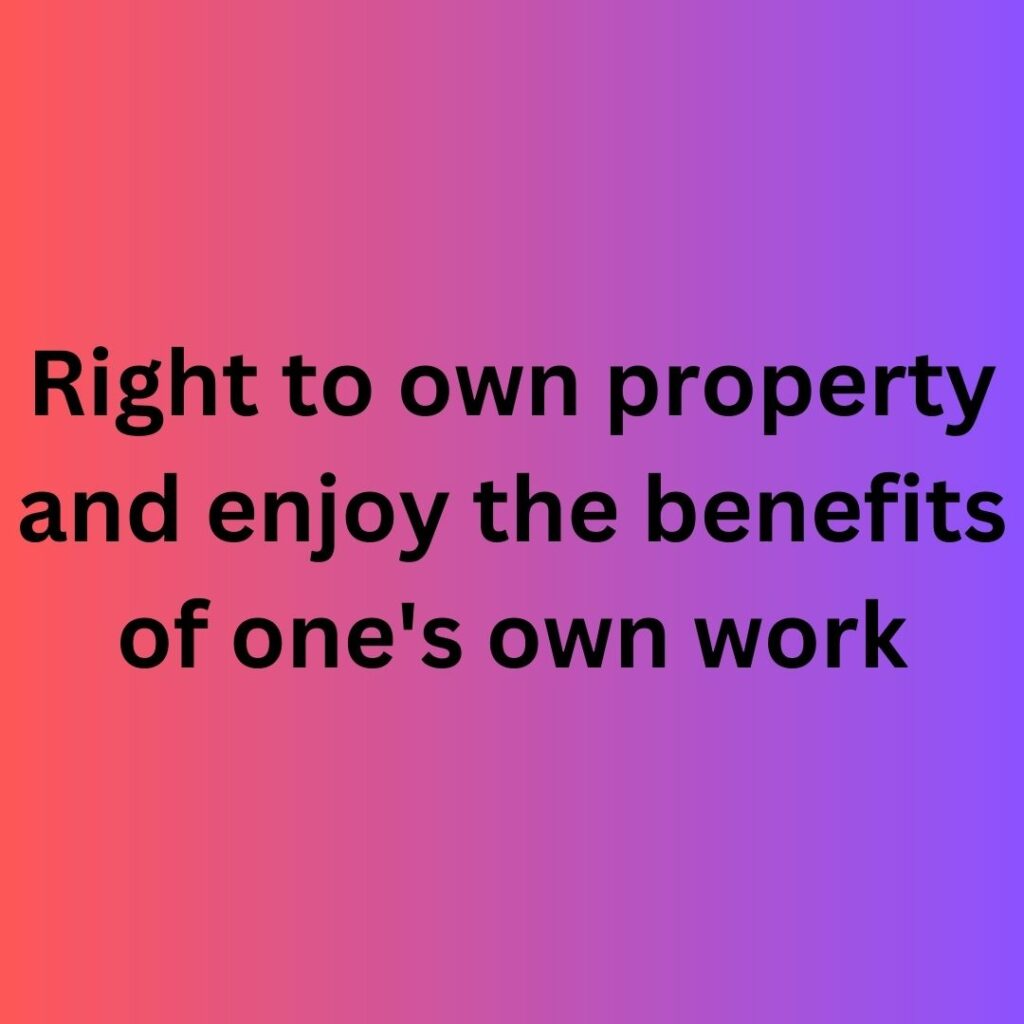
The right to own property and enjoy the benefits of one’s own work is a fundamental human right that is recognized and protected by law. This right is enshrined in various international human rights treaties, as well as in the constitutions of many countries.
संपत्ति का अधिकार और अपने स्वयं के काम के लाभों का आनंद लेने का अधिकार एक मौलिक मानव अधिकार है जिसे कानून द्वारा मान्यता प्राप्त और संरक्षित किया जाता है। यह अधिकार विभिन्न अंतरराष्ट्रीय मानवाधिकार संधियों के साथ-साथ कई देशों के संविधानों में निहित है।
The right to own property means that every person has the right to acquire, use, and dispose of property, without arbitrary interference or expropriation by the state or others. This includes the right to own both tangible property, such as land and buildings, and intangible property, such as intellectual property.
संपत्ति के अधिकार का अर्थ है कि प्रत्येक व्यक्ति को राज्य या अन्य के मनमाने हस्तक्षेप या स्वामित्व के बिना संपत्ति के अधिग्रहण, उपयोग और निपटान का अधिकार है। इसमें मूर्त संपत्ति, जैसे भूमि और भवन, और अमूर्त संपत्ति, जैसे बौद्धिक संपदा, दोनों का अधिकार शामिल है।
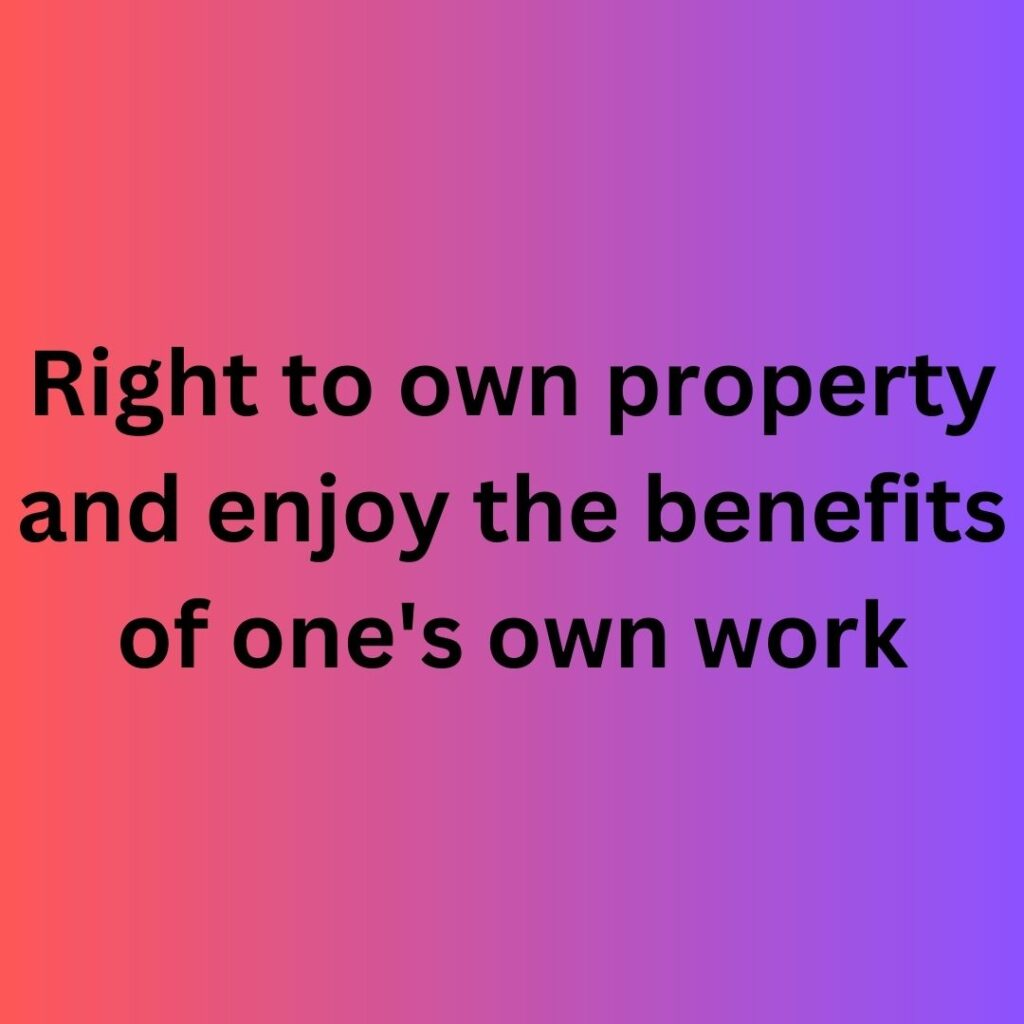
The right to enjoy the benefits of one’s own work means that every person has the right to work and to enjoy the fruits of their labor, without exploitation or discrimination. This includes the right to fair wages, safe working conditions, and the right to form and join trade unions.
अपने स्वयं के काम के लाभों का आनंद लेने का अधिकार का अर्थ है कि प्रत्येक व्यक्ति को बिना किसी शोषण या भेदभाव के काम करने और अपने श्रम के फल का आनंद लेने का अधिकार है। इसमें उचित मजदूरी का अधिकार, काम करने की सुरक्षित स्थिति और ट्रेड यूनियन बनाने और उसमें शामिल होने का अधिकार शामिल है।
The right to own property and enjoy the benefits of one’s own work are considered essential for promoting economic growth, social development, and individual freedom. They help to ensure that individuals have the opportunity to develop their potential, to contribute to society, and to enjoy the benefits of their hard work.
आर्थिक विकास, सामाजिक विकास और व्यक्तिगत स्वतंत्रता को बढ़ावा देने के लिए संपत्ति का अधिकार और अपने स्वयं के काम के लाभों का आनंद लेने का अधिकार आवश्यक माना जाता है। वे यह सुनिश्चित करने में मदद करते हैं कि व्यक्तियों को अपनी क्षमता विकसित करने, समाज में योगदान करने और अपनी कड़ी मेहनत के लाभों का आनंद लेने का अवसर मिले।
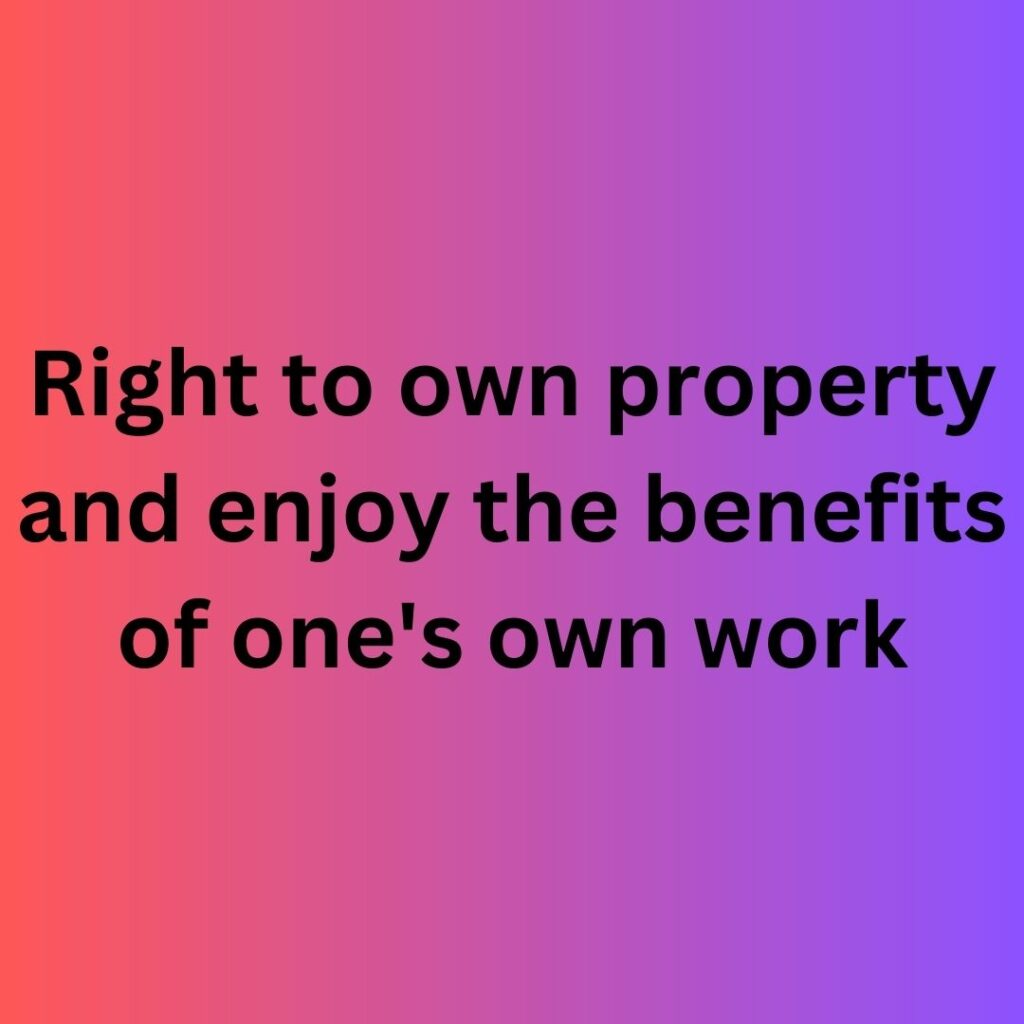
However, despite the legal protections that exist, many people still face barriers in accessing these rights, such as discrimination, poverty, and lack of resources. To address these challenges, it is important for governments and other stakeholders to work together to develop policies and programs that promote these rights and ensure that they are available to all individuals, without discrimination or barriers.
हालाँकि, मौजूद कानूनी सुरक्षा के बावजूद, बहुत से लोग अभी भी इन अधिकारों तक पहुँचने में बाधाओं का सामना करते हैं, जैसे कि भेदभाव, गरीबी और संसाधनों की कमी। इन चुनौतियों का समाधान करने के लिए, सरकारों और अन्य हितधारकों के लिए नीतियों और कार्यक्रमों को विकसित करने के लिए एक साथ काम करना महत्वपूर्ण है जो इन अधिकारों को बढ़ावा देते हैं और यह सुनिश्चित करते हैं कि वे बिना किसी भेदभाव या बाधाओं के सभी व्यक्तियों के लिए उपलब्ध हों।
Right to own property and enjoy the benefits of one’s own work
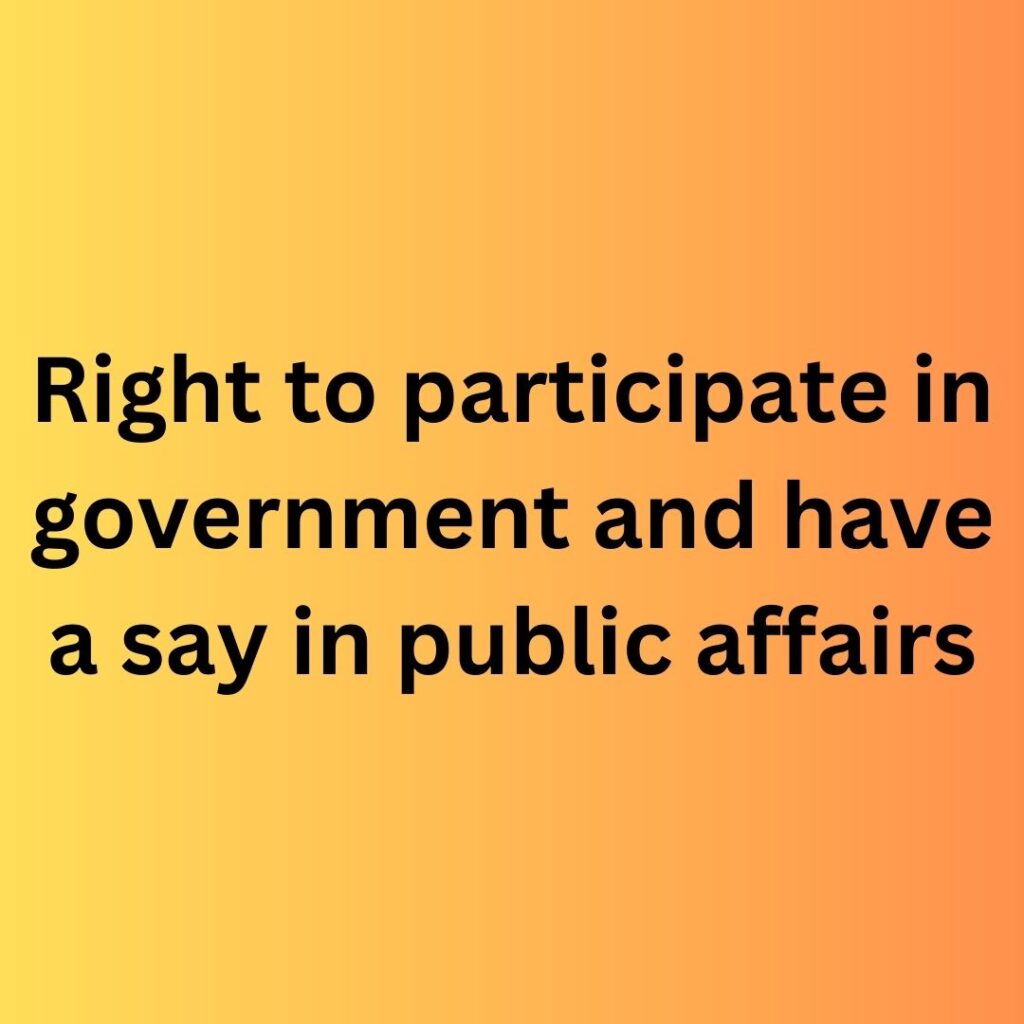
The right to own property and enjoy the benefits of one’s own work is a fundamental human right that is recognized and protected by law. This right is enshrined in various international human rights treaties, as well as in the constitutions of many countries.
संपत्ति का अधिकार और अपने स्वयं के काम के लाभों का आनंद लेने का अधिकार एक मौलिक मानव अधिकार है जिसे कानून द्वारा मान्यता प्राप्त और संरक्षित किया जाता है। यह अधिकार विभिन्न अंतरराष्ट्रीय मानवाधिकार संधियों के साथ-साथ कई देशों के संविधानों में निहित है।
The right to own property means that every person has the right to acquire, use, and dispose of property, without arbitrary interference or expropriation by the state or others. This includes the right to own both tangible property, such as land and buildings, and intangible property, such as intellectual property.
संपत्ति के अधिकार का अर्थ है कि प्रत्येक व्यक्ति को राज्य या अन्य के मनमाने हस्तक्षेप या स्वामित्व के बिना संपत्ति के अधिग्रहण, उपयोग और निपटान का अधिकार है। इसमें मूर्त संपत्ति, जैसे भूमि और भवन, और अमूर्त संपत्ति, जैसे बौद्धिक संपदा, दोनों का अधिकार शामिल है।
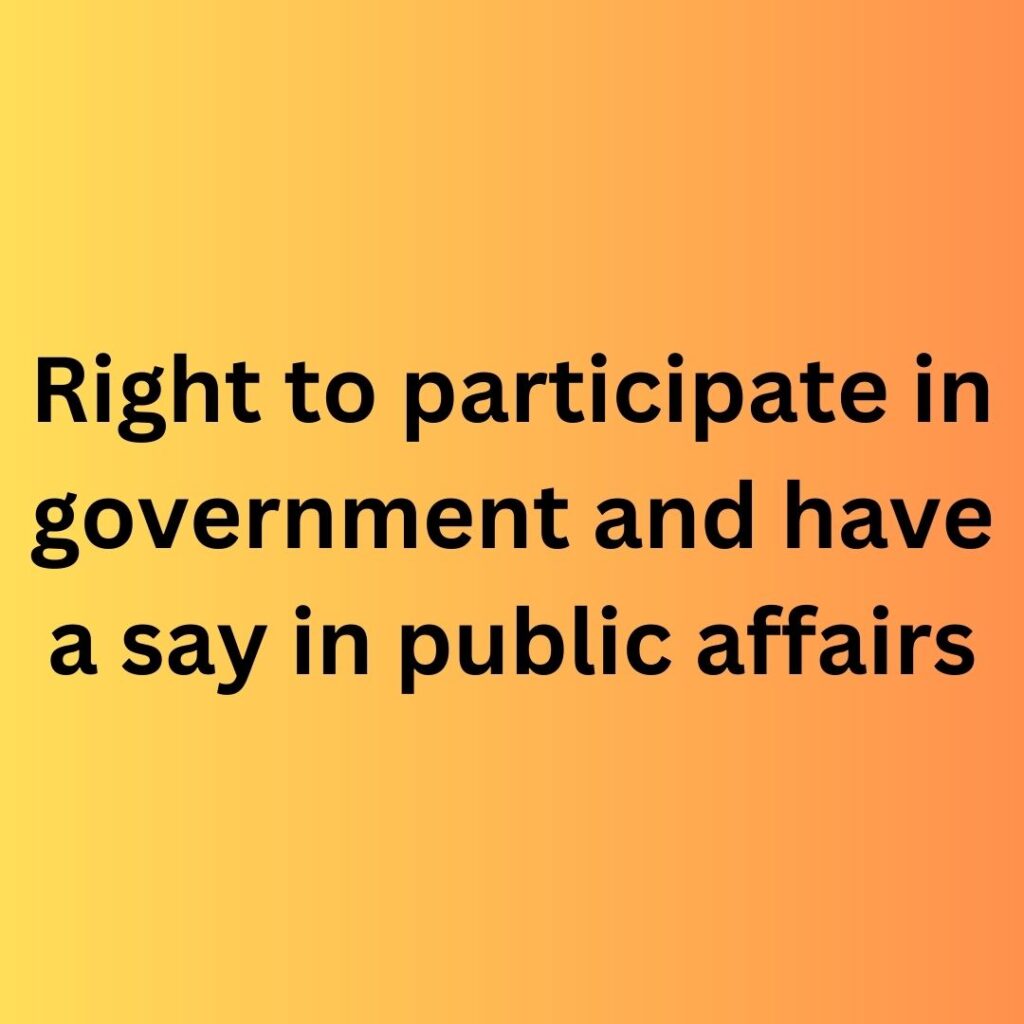
The right to enjoy the benefits of one’s own work means that every person has the right to work and to enjoy the fruits of their labor, without exploitation or discrimination. This includes the right to fair wages, safe working conditions, and the right to form and join trade unions.
अपने स्वयं के काम के लाभों का आनंद लेने का अधिकार का अर्थ है कि प्रत्येक व्यक्ति को बिना किसी शोषण या भेदभाव के काम करने और अपने श्रम के फल का आनंद लेने का अधिकार है। इसमें उचित मजदूरी का अधिकार, काम करने की सुरक्षित स्थिति और ट्रेड यूनियन बनाने और उसमें शामिल होने का अधिकार शामिल है।
The right to own property and enjoy the benefits of one’s own work are considered essential for promoting economic growth, social development, and individual freedom. They help to ensure that individuals have the opportunity to develop their potential, to contribute to society, and to enjoy the benefits of their hard work.
आर्थिक विकास, सामाजिक विकास और व्यक्तिगत स्वतंत्रता को बढ़ावा देने के लिए संपत्ति का अधिकार और अपने स्वयं के काम के लाभों का आनंद लेने का अधिकार आवश्यक माना जाता है। वे यह सुनिश्चित करने में मदद करते हैं कि व्यक्तियों को अपनी क्षमता विकसित करने, समाज में योगदान करने और अपनी कड़ी मेहनत के लाभों का आनंद लेने का अवसर मिले।
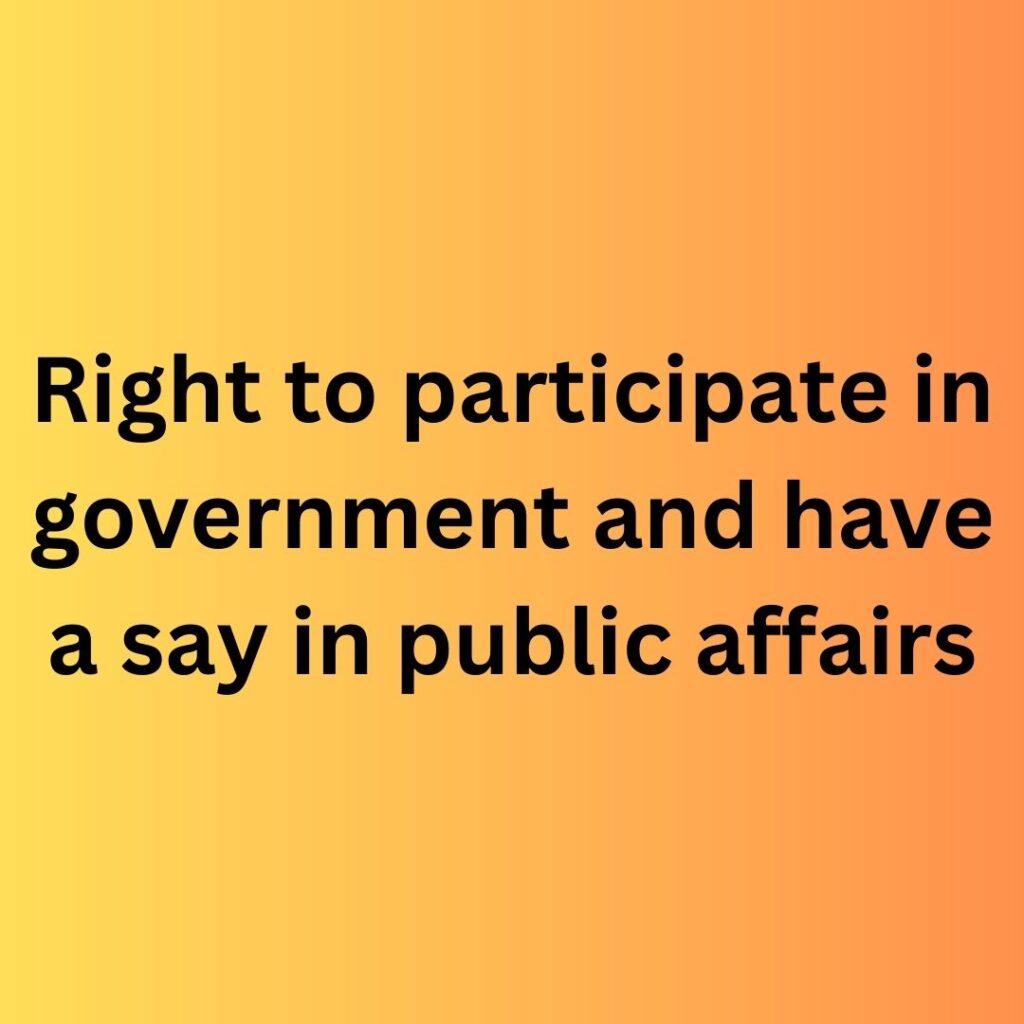
However, despite the legal protections that exist, many people still face barriers in accessing these rights, such as discrimination, poverty, and lack of resources. To address these challenges, it is important for governments and other stakeholders to work together to develop policies and programs that promote these rights and ensure that they are available to all individuals, without discrimination or barriers.
हालाँकि, मौजूद कानूनी सुरक्षा के बावजूद, बहुत से लोग अभी भी इन अधिकारों तक पहुँचने में बाधाओं का सामना करते हैं, जैसे कि भेदभाव, गरीबी और संसाधनों की कमी। इन चुनौतियों का समाधान करने के लिए, सरकारों और अन्य हितधारकों के लिए नीतियों और कार्यक्रमों को विकसित करने के लिए एक साथ काम करना महत्वपूर्ण है जो इन अधिकारों को बढ़ावा देते हैं और यह सुनिश्चित करते हैं कि वे बिना किसी भेदभाव या बाधाओं के सभी व्यक्तियों के लिए उपलब्ध हों।
Right to participate in government and have a say in public affairs
The right to participate in government and have a say in public affairs is a fundamental human right that is recognized and protected by law. This right is enshrined in various international human rights treaties, as well as in the constitutions of many countries.
सरकार में भाग लेने और सार्वजनिक मामलों में बोलने का अधिकार एक मौलिक मानव अधिकार है जिसे कानून द्वारा मान्यता प्राप्त और संरक्षित किया जाता है। यह अधिकार विभिन्न अंतरराष्ट्रीय मानवाधिकार संधियों के साथ-साथ कई देशों के संविधानों में निहित है। The right to participate in government means that every person has the right to take part in the governance of their country, either directly or through freely chosen representatives. This includes the right to vote and to stand for public office, the right to participate in public decision-making processes, and the right to access government information. सरकार में भाग लेने के अधिकार का अर्थ है कि प्रत्येक व्यक्ति को सीधे या स्वतंत्र रूप से चुने गए प्रतिनिधियों के माध्यम से अपने देश के शासन में भाग लेने का अधिकार है। इसमें मतदान का अधिकार और सार्वजनिक पद के लिए खड़े होने का अधिकार, सार्वजनिक निर्णय लेने की प्रक्रिया में भाग लेने का अधिकार और सरकारी जानकारी तक पहुँचने का अधिकार शामिल है। The right to have a say in public affairs means that every person has the right to express their opinions, to access information, and to hold public officials accountable for their actions. This includes the right to freedom of expression, the right to peaceful assembly and association, and the right to access independent media. सार्वजनिक मामलों में अपनी बात कहने के अधिकार का अर्थ है कि प्रत्येक व्यक्ति को अपनी राय व्यक्त करने, सूचना प्राप्त करने और सार्वजनिक अधिकारियों को उनके कार्यों के लिए जवाबदेह ठहराने का अधिकार है। इसमें अभिव्यक्ति की स्वतंत्रता का अधिकार, शांतिपूर्ण सभा और संघ का अधिकार और स्वतंत्र मीडिया तक पहुंच का अधिकार शामिल है। The right to participate in government and have a say in public affairs are considered essential for promoting democracy, accountability, and good governance. They help to ensure that individuals have a voice in the decisions that affect their lives, and that public officials are held accountable for their actions. लोकतंत्र, जवाबदेही और सुशासन को बढ़ावा देने के लिए सरकार में भाग लेने और सार्वजनिक मामलों में अपनी बात कहने का अधिकार आवश्यक माना जाता है। वे यह सुनिश्चित करने में मदद करते हैं कि उनके जीवन को प्रभावित करने वाले निर्णयों में लोगों की राय हो, और सार्वजनिक अधिकारियों को उनके कार्यों के लिए जवाबदेह ठहराया जाए। However, despite the legal protections that exist, many people still face barriers in accessing these rights, such as discrimination, censorship, and lack of resources. To address these challenges, it is important for governments and other stakeholders to work together to develop policies and programs that promote these rights and ensure that they are available to all individuals, without discrimination or barriers. हालांकि, मौजूद कानूनी सुरक्षा के बावजूद, बहुत से लोग अभी भी इन अधिकारों तक पहुँचने में बाधाओं का सामना करते हैं, जैसे कि भेदभाव, सेंसरशिप और संसाधनों की कमी। इन चुनौतियों का समाधान करने के लिए, सरकारों और अन्य हितधारकों के लिए नीतियों और कार्यक्रमों को विकसित करने के लिए एक साथ काम करना महत्वपूर्ण है जो इन अधिकारों को बढ़ावा देते हैं और यह सुनिश्चित करते हैं कि वे बिना किसी भेदभाव या बाधाओं के सभी व्यक्तियों के लिए उपलब्ध हों।








